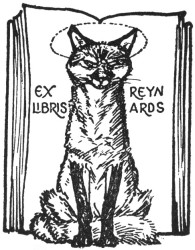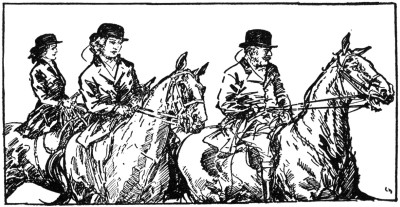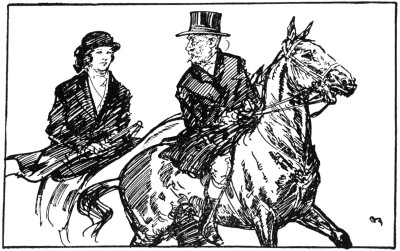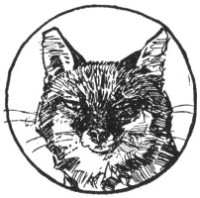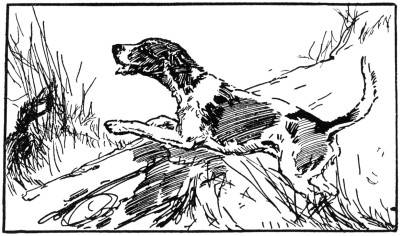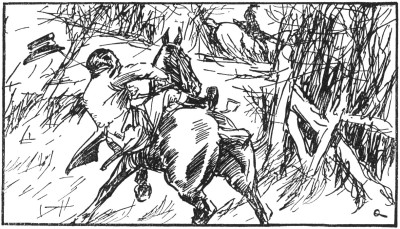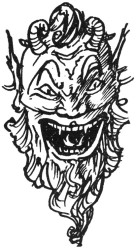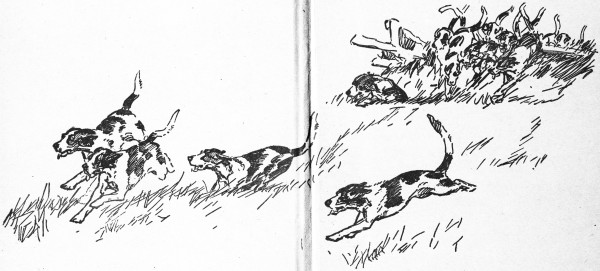REYNARD THE FOX
THE MACMILLAN COMPANY
new york · boston · chicago · dallas
atlanta · san fransisco
MACMILLAN & CO., Limited
london · bombay · calcutta
melbourne
THE MACMILLAN CO. OF CANADA, Ltd.
toronto
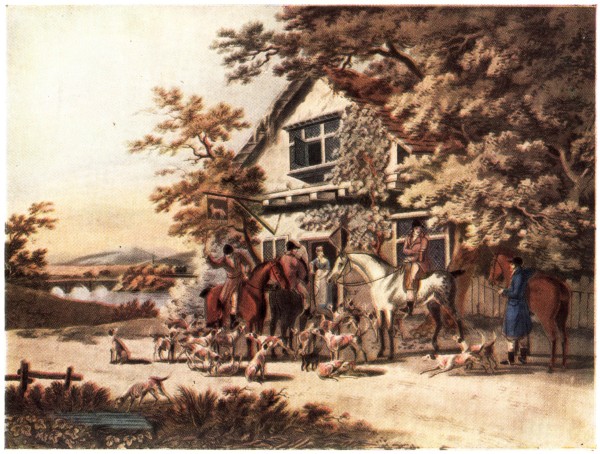 Courtesy Arthur Ackermann and Son, New York
Courtesy Arthur Ackermann and Son, New York
REYNARD THE FOX
BY
JOHN MASEFIELD
NEW EDITION WITH EIGHT PLATES IN COLOUR AND
MANY ILLUSTRATIONS BY
CARTON MOOREPARK
New York
THE MACMILLAN COMPANY
1920
All rights reserved
Copyright, 1919 and 1920,
By JOHN MASEFIELD.
New illustrated edition, October, 1920.
Norwood Press
J. S. Cushing Co.—Berwick & Smith Co.
Norwood, Mass., U.S.A.
INTRODUCTION
I have been asked to write why I wrote this poem of "Reynard
the Fox." As a man grows older, life becomes more interesting
but less easy to know; for, late in life, even the strongest yields
to the habit of his compartment. When he cannot range through
all society, from the court to the gutter, a man must go where
all society meets, as at the Pilgrimage, the Festival or the Game.
Here in England the Game is both a festival and an occasion of
pilgrimage. A man wanting to set down a picture of the society
of England will find his models at the games.
What are the English games? The man's game is Association
football; the woman's game, perhaps, hockey or lacrosse. Golf
I regard more as a symptom of a happy marriage than a game.
Cricket, which was once widely popular among both sexes has lost
its hold, except among the young. The worst of all these games
is that few can play them at a time.
But in the English country, during the autumn, winter and
early spring of each year, the main sport is fox hunting, which
is not like cricket or football, a game for a few and a spectacle
for many, but something in which all who come may take a part,
whether rich or poor, mounted or on foot. It is a sport loved and
followed by both sexes, all ages and all classes. At a fox hunt,
and nowhere else in England, except perhaps at a funeral, can
you see the whole of the land's society brought together, focussed
for the observer, as the Canterbury pilgrims were for Chaucer.
This fact made the subject attractive. The fox hunt gave an
opportunity for a picture or pictures of the members of an English
community.
Then to all Englishmen who have lived in a hunting country,
hunting is in the blood, and the mind is full of it. It is the most
beautiful and the most stirring sight to be seen in England. In
the ports, as at Falmouth, there are ships under sail, under way,
coming or going, beautiful unspeakably. In the country, especially
on the great fields on the lower slopes of the Downland, the
teams of the ploughmen may be seen bowing forward on a sky-line,
and this sight can never fail to move one by its majesty of
beauty. But in neither of these sights of beauty is there the
bright colour and swift excitement of the hunt, nor the thrill of
the horn, and the cry of the hounds ringing into the elements of
the soul. Something in the hunt wakens memories hidden in the
marrow, racial memories, of when one hunted for the tribe, animal
memories, perhaps, of when one hunted with the pack, or was
hunted.
Hunting has always been popular here in England. In ancient
times it was necessary. Wolves, wild boar, foxes and deer had
to be kept down. To hunt was then the social duty of the mounted
man, when he was not engaged in war. It was also the opportunity
of all other members of the community to have a good time in
the open, with a feast or a new fur at the end, to crown the
pleasure.
Since arms of precision were made, hunting on horseback with
hounds has perhaps been unnecessary everywhere, but it is not
easy to end a pleasure rooted in the instincts of men. Hunting
has continued, and probably will continue, in this country and
in Ireland. It is rapidly becoming a national sport in the United
States.
Some have written, that hunting is the sport of the wealthy
man. Some wealthy men hunt, no doubt, but they are not the
backbone of the sport, so much as those who love and use horses.
Parts of this country, of Ireland and of the United States are more
than ordinarily good pasture, fitted for the breeding of horses,
beyond most other places in the world. Hardly anywhere else
is the climate so equable, the soil so right for the feet of colts and
the grass so good. Where these conditions exist, men will breed
horses and use them. Men who breed good horses will ride,
jump and test them, and will invent means of riding, jumping
and testing them, the steeplechase, the circus, the contests at
fairs and shows, the point-to-point meeting, and they will preserve,
if possible, any otherwise dying sport which offers such means.
I have mentioned several reasons why fox hunting should be
popular: (a) that it is a social business, at which the whole community
may and does attend in vast numbers in a pleasant mood of
goodwill, good humour and equality, and during which all may
go anywhere, into ground otherwise shut to them; (b) that it is
done in the winter, at a season when other social gatherings are
difficult, and in country districts where no buildings, except the
churches, could contain the numbers assembled; (c) that it is
most beautiful to watch, so beautiful that perhaps very few of
the acts of men can be so lovely to watch nor so exhilarating.
The only thing to be compared with it, in this country, is the
sword dance, the old heroical dancing of the young men, still
practised, in all its splendour of wild beauty, in some country places;
(d) that we are a horse-loving people who have loved horses as
we have loved the sea, and have made, in the course of generations,
a breed of horse, second to none in the world, for beauty
and speed.
But besides all these reasons, there is another that brings many
out hunting. This is the delight in hunting, in the working of
hounds, by themselves, or with the huntsmen, to find and kill
their fox. Though many men and women hunt in order to ride,
many still ride in order to hunt.
Perhaps this delight in hunting was more general in the mid-eighteenth
century, when hounds were much slower than at
present. Then, the hunt was indeed a test of hounds and huntsman.
The fox was not run down but hunted down. The great
run then was that in which hounds and huntsman kept to their
fox. The great run now is perhaps that in which some few riders
keep with the hounds.
The ideal run of 1750 might have been described thus:—
"Being in the current of Writing, I cannot but acquaint your
Lorp of ye great Hunt there was, this Tuesday last there was a
a Week. Sure so great a day has not been seen here since The
Day your Lorp's Father broke his Collar Bone at ye Park Wall.
As Milton says:—
"Well have we speeded, and o'er Hill and Dale
Forest and Field and Flood ...
As far as Indus east, Euphrates west."
"We had but dismle Weather of it, and so cold, as made Sir
Harry observe, that it was an ill wind blew no-one any good.
We met at ye Tailings. I had out my brown Horse. There was
present Sir Anthony Smoaker; Mr. Jarvis of Copse Stile; William
Travis; John Hawbuck; your Lorp's Friend, Dick Fancowe, and
two of ye Red Coats from ye Barracks. Ye fair Sex was dismayed,
it was said, by ye rudeness of ye Elements; they did not
venture it.
"On coming to draw Tailings Wood, Glider spoke to it, and
Tom viewed him away for the Valley, being the old Dog Fox,
with the white Mask, that beat us at Fubb's Field, the day your
Lorp road Bluebell.
"Now spoke the chearful Horn; and tuneful Hounds
Echoed, and Red Coats gallopped; stirring Scean,
Rude Health and Manly Wit together strive.
"We went with the extream of Violence from Tailings Wood
to ye small Coppice at Nap Hill where a Fellow put him from his
Point, which gave Occasion to Sir Anthony to correct him. Ye
little magpie Hound made it out in ye bog at ye back of ye Coppice,
when again Hounds went at head through Long Stone Pastures
as far as Tainton. Here we was delayed in ye Dear Park,
the effluvia of ye Dear being extream strong and doubtless puzzling
to the Noses of ye Hounds. And here I cannot but remark the
skill with which ye Hounds worked it out till they had hit it
off, a sight, as Mr. Jarvis remarked to me, worthy of the Admiration
of an antient Philosopher, and of the eloquence of a most
elegant Wit, or Poet. Leaving ye Dear Park, He made for Norton
Cross, which he left on his left Hand, as though deciding for ye
Hill. Crossing ye Hill, in Spite of ye Sheep, he was a little staggered
by his being run by one of ye Shepherd's Doggs, a part of
Creation that should not be tolerated, except in ye vision of ye
Poet, as in a Pastoral or so. Here Joe Phillips, our Huntsman,
made unavailing Casts, but by lifting to the Vineyard recovered
him, when Hounds run him to Cow's Crookham, on your Lorp's
Aston Estate.
"By this Time, your Lorp will understand our Distress. Dick
Fancowe was in ye Brook at Norton, Mr. Jarvis' grey Horse had
cast a Shoe, and one of ye Red Coats had broak his Liver in falling
at a Fence. For a time we went about to recover him:—
"Now with attentive Nose the restless Hound
Endeavours on the Scent, now here, now there,
Scorning adulterat scents of lesser Prey.
Now gloomy care invades the Huntsman's Face;
And Sportsmen (jovial erst) on weary steeds
Sit pensive."
Here might well be seen the Advantages of a judicious Breeding in
Hounds, that neglects not the intellectual Part, but aims rather
at a complete Animal than alone at Sinews and Corporeal Structure.
That Blood of the Old Berkshire Glorious, which your
Lorp's Father was wont to observe, was what he most stood by,
next to our Constitution and the Protestant Succession, here
stood us in good stead, for it was to Glorious ye Ninth, as well
as to Growler and Glider (all of ye same royal strain) that we
was indebted to ye happy Conclusion. They pushed him out of
ye Stubbings at Cow's Crookham, where it seems he had taken
Refuge in the Hollow of a decayed Tree. We chac't him thence
upon ye Grass to Shepherd's Hey. Here he began to run short,
being not a little apprehensive, lest his Foes should triumph, and
snatch from him that Life, which he had so long nefariously
pampered.
On courtly Cock with all his household Train
Of Hens obsequious, by the Hen Wife mourned.
"The Sun, coming out from among ye Clouds, where he had been
too long hid, made (as was elegantly pretended by Sir Anthony), a
Brightness, animating indeed to us, who carried the Sword of
Justice, but, to the Criminal of our Pursuit, infinitely distressing.
Then had your Lorp seen the gay Ardor of the Pack, as they came
to the View, which they did about Stonepits, your Lorp would
have said with the late elegant Poet:
"Now o'er the glittering grass the sinewy Hound
Shakes from his Feet the Dew and makes ye Woods resound."
"To be brief, we killed in the Back Yard of ye Rummer and Glass
after two and three quarters Hours of a Hunt such as (all are
agreed) is not lightly to be parallelled. There was present at
ye Death, beside Joe Phillips and Tom, Sir A. Smoaker, Mr. Wm. Travis
and myself, all so extream distresst, Men and Beasts, that
it was observed, it was a Marvel ye Horses were not dead. Such
an Hunt, it was agreed, should be celebrated by an annual Dinner,
at which the Toast of ye Chase might be rendered more than
ordinary. Ye Hunt was upwards of Fifteen Miles in Length, and
hath been the Subject of a Song, by a Member of Ye Hunt,
which, as it would take long to transcribe, I forbear, hoping that
we may sing it to your Lorp before (as ye Poet says)
"Ye vixen hath laid up her Cubs
In snuggest Cave secure, when balmy Spring
Wakens ye Meadows."
"But to pass now from Celestial Pleasures to Worldly Cares, I
have to acquaint your Lorp that your Lorp's Sister's Son, Mr.
Parracombe, hath been killed by a Fall from his Horse, after
Dinner with some Gentlemen, his particular Friends, an Affliction
indeed great, humanly regarded, were it not also considered, how
much happier his Lot must be, than in this Vale of Tears, etc.
Ye Young Hounds thrive apace, and it is thought the forward
Season will be very favourable for their future Prey. I am, your
Lorp's most obedient, Charles Cothill."
Perhaps the ideal run of the present time would be described
as follows:—
"A large field attended the Templecombe on Tuesday last at
the popular meet at Heydigates. Will Mynors, late of the Parratts,
carried the horn, in place of Tom Carling, now with
Mr. Fletchers. A little time was spent in running through the
shrubberies in the garden at Heydigates and then the word was
given for the Cantlows. Will had no sooner put hounds into
this famous cover than the dog pack proclaimed the joyous news.
The fox, a traveller, was at once viewed away for the Three Oaks,
across the rather heavy going of the pasture land. Coming to
the Knock Brook, he swam it near Parson's Pleasure, going at
a pace that let the knowing ones know that they were in for something
out of the common. Keeping Snib's Farm on his right, he
ran dead straight for Gallow's Wood, where some woodmen with
their teams disturbed him. Swinging to his left, he went up the
hill, through Bloody Lane, as though towards Dinsmore, but was
again deflected by woodmen. Turning down the hill, he ran
for the valley, passing Enderton Schoolhouse, the scholars of
which were much cheered by the near prospect of the hunt. It
was now evident that he was going for the Downs. Some of
the less daring began to express the hope that he might be headed.
"Scent from the first was burning and the pace a cracker.
After leaving Enderton he made straight for the Danesway, past
Snub's Titch and the Curlews, the green meadows of the pasture
being sprinkled for miles with the relics of the field. He crossed
the Roman Road at Orm's Oak and at once entered the Danesway,
going at a pace which all thought could not last.
"At the summit of the Danesway, known as the Gallows Point,
hounds were brought to their noses, owing to the crossing of the
line by sheep. A man working nearby was able to give the line
and Will, lifting beyond the Lynchets, at once hit him off, and
the hounds resumed their rush. From this point, they went almost
exactly straight from the head of the Danesway to the fir copse
by Arthur's Table. All this part of the run being across a rolling
grass land, was at top speed, such as no horse could live with.
At Arthur's Table, he was put from his earth by shooters who
were netting the warren. As he could not get through them nor
across the highway, then busy with traffic, He doubled down across
the Starvings, where Will, the only man up at this point, although
now three hundred yards behind hounds, caught sight of him on
the opposite slope, romping away from hounds as though he would
never grow old. On coming to the level, past Spinney's End,
some of those who had been left at the Lynchets were able to
rejoin, but were soon again cast out by the extreme violence of
the going, which continued back across the Downs on a line obliquely
parallel with his former track though a mile further to the
south. It was supposed that he was going for the main earth
in Bloody Acre Copse. Some workers in the strip at the edge of
the copse headed him from this point. He swung left-handed past
Staves acre, and so down to the valley by the shelving ground
near Monk's Charwell. Here, for some unaccountable reason,
the scent, which had been breast high, became catchy, and hounds
lost their fox in the Osier cars at Charwell Springs. Later in the
afternoon, while jogging home, a second fox was chopped in Mr.
Parsloe's cover at Prince's Charwell. Hounds then went home.
"The run from the Cantlows was not remarkable for any quality
of hunting, but extremely so for pace and length. The distance
run, from Cantlows Wood to the Osiers cannot have been less than
thirteen miles, most of it indeed on the best going in the world,
but at a racing pace, with nothing that can be called a check,
the whole way. Some wished that the hounds might have been
rewarded and others that Will Mynors might have crowned his
opening gallop with a kill, but the general feeling was one of
satisfaction that so game a fox escaped."
My own interest in fox hunting began at a very early age.
I was born in a good hunting country, partly woodland, partly
pasture. My home, during my first seven years, was within
half a mile of the kennels. I saw hounds on most days of my life.
Hounds and hunting filled my imagination. I saw many meets,
each as romantic as a circus. The huntsman and whipper-in
seemed, then, to be the greatest men in the world, and those
mild slaves, the hounds, the loveliest animals.
Often, as a little child, I saw and heard hounds hunting in and
near a covert within sight of my old home. Once, when I was,
perhaps, five years old, the fox was hunted into our garden, and
those glorious beings in scarlet, as well as the hounds, were all
about my lairs, like visitants from Paradise. The fox, on this
occasion, went through a woodshed and escaped.
Later in my childhood, though I lived less near to the kennels,
I was still within a mile of them, and saw hounds frequently at
all seasons. In that hunting country, hunting was one of the
interests of life; everybody knew about it, loved, followed,
watched and discussed it. I went to many meets, and followed
many hunts on foot. Each of these occasions is now distinct in
my mind, with the colour and intensity of beauty. I saw many
foxes starting off upon their runs, with the hounds close behind
them. It was then that I learned to admire the ease and beauty
of the speed of the fresh fox. That leisurely hurry, which romps
away from the hardest trained and swiftest fox hounds without a
visible effort, as though the hounds were weighted with lead,
is the most lovely motion I have seen in an animal.
No fox was the original of my Reynard, but as I was much in
the woods as a boy I saw foxes fairly often, considering that they
are night-moving animals. Their grace, beauty, cleverness, and
secrecy always thrilled me. Then that kind of grin which the
mask wears made me credit them with an almost human humour.
I thought the fox a merry devil, though a bloody one. Then he
is one against many, who keeps his end up, and lives, often snugly,
in spite of the world. The pirate and the nightrider are nothing
to the fox, for romance and danger. This way of life of his makes
it difficult to observe him in a free state at close quarters.
Once in the early spring in the very early morning, I saw a
vixen playing with her cubs in the open space below a beech tree.
Once I came upon a big dog-fox in a wheel-wright's yard, and
watched him from within a few paces for some minutes. Twice
I have watched half-grown cubs stalking rabbits. Twice out hunting,
the fox has broken cover within three yards of me. These are
the only free foxes which I have seen at close quarters. Foxes
are night-moving animals. To know them well one should have
cat's eyes and foxes' habits. By the imagination alone can men
know foxes.
When I was about halfway through my poem, I found a dead
dog-fox in a field near Cumnor Hurst. He was a fine full-grown
fox in perfect condition; he must have picked up poison, for he
had not been hunted, nor shot. On the pads of this dead fox, I
noticed for the first time, the length and strength of a fox's claws.
Some have asked, whether the Ghost Heath Run is founded on
any recorded run of any real Hunt. It is not. It is an imaginary
run, in a country made up of many different pieces of country,
some of them real, some of them imaginary. These real and
imaginary fields, woods and brooks are taken as they exist, from
Berkshire, where the fox lives, from Herefordshire where he was
found, from Trapalanda, Gloucestershire, Buckinghamshire, Herefordshire,
Worcestershire and Berkshire, where he ran, from Trapalanda,
where he nearly died, and from a wild and beautiful
corner in Berkshire where he rests from his run.
Some have asked when the poem was written. It was written
between January 1 and May 20, 1919.
Some have asked, whether hunting will soon be abolished.
I cannot tell, but I think it unlikely. People do not willingly
resign their pleasures; men who breed horses will want to gallop
them across country; hunting is a pleasure, as well as an opportunity
to gallop; it is also an instinct in man. Some have thought
that if "small holdings," that is "produce gardens," intensively
cultivated, of about an acre apiece, became common, so that the
country became more rigidly enclosed than at present, hunting
would be made almost impossible. The small holding is generally
the property of the small farmer (like the French cultivateur) who
fences permanently with wire and cannot take down the wire
during the hunting season, as most English farmers do at present.
Small holdings will probably increase in number near towns, but
farmers seem agreed that they can never become the national
system of farming. The big farm, that can treat the great tract
with machines, seems likely to be the farm of the future.
Even if the small holdings system were to prevail, it would
hardly prevail over the sporting instincts of the race. Beauty
and delight are stronger than the will to work. I am pretty sure
that a pack of hounds, coming feathery by, at the heels of a whip's
horse, while the field takes station and the huntsman, drawing
his horn, prepares to hunt, would shake the resolve of most small
holders, digging in their lots with thrift, industry and self-control.
And then, if the huntsman were to blow his horn, and the hounds
to feather on it and give tongue, and find, and go away at head,
I am pretty sure that most of the small holders of this race would
follow them. It is in this race to hunt.
I will conclude with a portrait of old Baldy Hill, the earth-stopper,
who in the darkness of the early morning gads about on
a pony, to "stop" or "put to" all earths, in which a hard-pressed
fox might hide. In the poem, he enters when the hunt is about
to start, but he is an important figure in a hunting community,
and deserves a portrait. He may come here, at the beginning,
for Baldy Hill is at the beginning of all fox hunts. He dates from
the beginning of Man. I have seen many a Baldy Hill in my life;
he never fails to give me the feeling that he is Primitive Man
survived. Primitive Man lived like that, in the woods, in the
darkness, outwitting the wild things, while the rain dripped, and
the owl cried, and the ghost came out from the grave. Baldy
Hill stole the last litter of the last she-wolf to cross them with the
King's hounds. He was in at the death of the last wild-boar.
Sometimes, in looking at him, I think that his ashen stake must
have a flint head, with which, on moony nights, he still creeps
out, to rouse, it may be, the mammoth in his secret valley, or
a sabretooth tiger, still caved in the woods. Life may and does
shoot out into exotic forms, which may and do flower and perish.
Perhaps when all the other forms of English life are gone, the
Baldy Hill form, the stock form, will abide, still striding, head
bent, with an ashen stake, after some wild thing, that has meat,
or fur, or is difficult or dangerous to tackle.
Old Baldy Hill, the game old cock,
Still wore knee-gaiters and a smock.
He bore a five foot ashen stick
All scarred and pilled from many a click
Beating in covert with his sons
To drive the pheasants to the guns.
His face was beaten by the weather
To wrinkled red like bellows leather
He had a cold clear hard blue eye.
His snares made many a rabbit die.
On moony nights he found it pleasant
To stare the woods for roosting pheasant
Up near the tree-trunk on the bough.
He never trod behind a plough.
He and his two sons got their food
From wild things in the field and wood,
By snares, by ferrets put in holes,
By ridding pasture-land of moles;
By keeping, beating, trapping, poaching
And spaniel-and-retriever-coaching.
He and his sons had special merits
In breeding and in handling ferrets
Full many a snaky hob and jill
Had bit the thumbs of Baldy Hill.
He had no beard, but long white hair.
He bent in gait. He used to wear
Flowers in his smock, gold-clocks and peasen;
And spindle-fruit in hunting season.
I hope that he may live to wear spindle-fruit for many seasons
to come. Hunting makes more people happy than anything I
know. When people are happy together, I am quite certain
that they build up something eternal, something both beautiful
and divine, which weakens the power of all evil things upon this
life of men and women.
CONTENTS
| | page |
| PART ONE |
| THE MEET | 1 |
| THE PLOUGHMAN | 13 |
| THE CLERGYMAN | 21 |
| THE PARSON | 31 |
| "JILL AND JOAN" | 37 |
| FARMER BENNETT | 41 |
| THE GOLDEN AGE | 47 |
| THE SQUIRE | 51 |
| THE DOCTOR | 61 |
| THE SAILOR | 69 |
| THE MERCHANT'S SON | 73 |
| SPORTSMAN | 77 |
| THE EXQUISITE | 93 |
| THE SOLDIER | 99 |
| THE COUNTRY'S HOPE | 103 |
| COUNTRYMEN | 107 |
| THE HOUNDS | 115 |
| THE WHIP | 125 |
| THE HUNTSMAN | 133 |
| THE MASTER | 139 |
| THE START | 147 |
| "COVER" | 159 |
| |
| PART TWO |
| THE FOX | 167 |
| THE ROVING | 175 |
| SCENT | 187 |
| SOUND | 191 |
| FOUND | 201 |
| AWAY | 207 |
| THE FIELD | 215 |
| THE RUN | 225 |
| FULL CRY | 233 |
| VIEW HALLOO | 253 |
| LAST HOPE | 269 |
| CHECKED | 275 |
| "ON" | 287 |
| THE LIFTING HORN | 299 |
| MOURNE END WOOD | 307 |
| "DONE" | 319 |
| PRIZE | 325 |
| HOME | 333 |
LIST OF FULL-PAGE ILLUSTRATIONS
By Carton Moorepark
| | page |
| The stables were alive with din | 5 |
| An old man with a gaunt, burnt face | 16 |
| All sport, from bloody war to craps | 80 |
| The Godsdown Tigress with her cub | 96 |
| A sea of moving heads, and sterns | 120 |
| His chief delight | 128 |
| He had a welcome and salute | 144 |
| The scarlet coats twixt tree and spray | 153 |
| And now they gathered to the gamble | 162 |
| He saw the farms where the dogs were barking | 172 |
| There he slept in the mild west weather | 182 |
| The boy's sweet whistle and dog's quick yaps | 185 |
| He faced the fence and put her through it | 222 |
| A white horse rising a dark horse flying | 256 |
| Then down the slope and up the road | 291 |
| He ran the sheep that their smell might check | 295 |
| With a cracking whip and "Hoik, Hoik, Hoik, Forrard" | 303 |
| He saw it now as a redness topped | 313 |
| And man to man with a gasp for breath | 330 |
| For with feet all bloody and flanks all foam | 336 |
COLOR PLATES
| First colored plate | Frontispiece |
| | facing page |
| Second colored plate | 28 |
| Third colored plate | 86 |
| Fourth colored plate | 150 |
| Fifth colored plate | 210 |
| Sixth colored plate | 236 |
| Seventh colored plate | 250 |
| Eighth colored plate | 338 |
PART I
[Pg 1]
THE MEET
[Pg 3]
REYNARD THE FOX,
OR
THE GHOST HEATH RUN
The meet was at "The Cock and Pye
By Charles and Martha Enderby,"
The grey, three-hundred-year-old inn
Long since the haunt of Benjamin
The highwayman, who rode the bay.
The tavern fronts the coaching way,
The mail changed horses there of old.
It has a strip of grassy mould
In front of it, a broad green strip.
A trough, where horses' muzzles dip,
Stands opposite the tavern front,
[Pg 4]
And there that morning came the hunt,
To fill that quiet width of road
As full of men as Framilode
Is full of sea when tide is in.
The stables were alive with din
From dawn until the time of meeting.
A pad-groom gave a cloth a beating,
Knocking the dust out with a stake.
Two men cleaned stalls with fork and rake,
And one went whistling to the pump,
The handle whined, ker-lump, ker-lump,
The water splashed into the pail,
And, as he went, it left a trail,
Lipped over on the yard's bricked paving.
Two grooms (sent on before) were shaving
[Pg 6]
There in the yard, at glasses propped
On jutting bricks; they scraped and stropped,
And felt their chins and leaned and peered,
A woodland day was what they feared
(As second horsemen), shaving there.
Then, in the stalls where hunters were,
Straw rustled as the horses shifted,
The hayseeds ticked and haystraws drifted
From racks as horses tugged their feed.
Slow gulping sounds of steady greed
Came from each stall, and sometimes stampings,
Whinnies (at well-known steps) and rampings
To see the horse in the next stall.
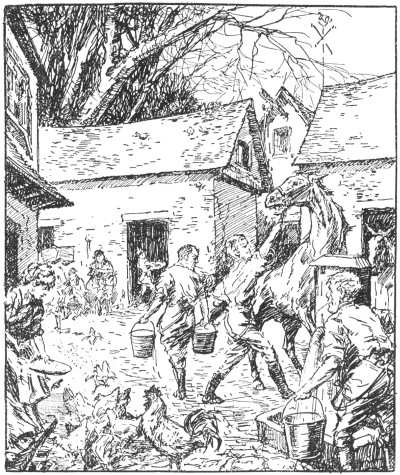 The stables were alive with din
The stables were alive with din
From dawn until the time of meeting.
Outside, the spangled cock did call
To scattering grain that Martha flung.
[Pg 7]
And many a time a mop was wrung
By Susan ere the floor was clean.
The harness room, that busy scene,
Clinked and chinked from ostlers brightening
Rings and bits with dips of whitening,
Rubbing fox-flecks out of stirrups,
Dumbing buckles of their chirrups
By the touch of oily feathers.
Some, with stag's bones rubbed at leathers,
Brushed at saddle-flaps or hove
Saddle linings to the stove.
Blue smoke from strong tobacco drifted
Out of the yard, the passers snifft it,
Mixed with the strong ammonia flavour
Of horses' stables and the savour
Of saddle-paste and polish spirit
[Pg 8]
Which put the gleam on flap and tirrit.
The grooms in shirts with rolled-up sleeves,
Belted by girths of coloured weaves,
Groomed the clipped hunters in their stalls.
One said, "My dad cured saddle galls,
He called it Doctor Barton's cure;
Hog's lard and borax, laid on pure."
And others said, "Ge' back, my son,"
[Pg 9]
"Stand over, girl; now, girl, ha' done."
"Now, boy, no snapping; gently. Crikes,
He gives a rare pinch when he likes."
"Drawn blood? I thought he looked a biter."
"I give 'em all sweet spit of nitre
For that, myself: that sometimes cures."
"Now, Beauty, mind them feet of yours."
They groomed, and sissed with hissing notes
To keep the dust out of their throats.
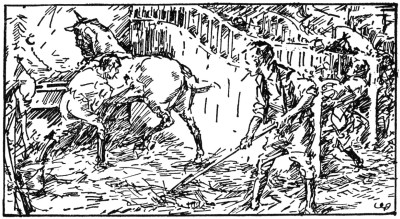
There came again and yet again
The feed-box lid, the swish of grain,
Or Joe's boots stamping in the loft,
The hay-fork's stab and then the soft
Hay's scratching slither down the shoot.
Then with a thud some horse's foot
[Pg 10]
Stamped, and the gulping munch again
Resumed its lippings at the grain.
The road outside the inn was quiet
Save for the poor, mad, restless pyat
Hopping his hanging wicker-cage.
No calmative of sleep or sage
Will cure the fever to be free.
He shook the wicker ceaselessly
Now up, now down, but never out
On wind-waves, being blown about,
Looking for dead things good to eat.
His cage was strewn with scattered wheat.
At ten o'clock, the Doctor's lad
Brought up his master's hunting pad
[Pg 11]
And put him in a stall, and leaned
Against the stall, and sissed, and cleaned
The port and cannons of his curb.
He chewed a sprig of smelling herb.
He sometimes stopped, and spat, and chid
The silly things his master did.
[Pg 13]
THE PLOUGHMAN
[Pg 15]
At twenty past, old Baldock strode
His ploughman's straddle down the road.
An old man with a gaunt, burnt face;
His eyes rapt back on some far place,
Like some starved, half-mad saint in bliss
In God's world through the rags of this.
He leaned upon a stake of ash
Cut from a sapling: many a gash
Was in his old, full-skirted coat.
The twisted muscles in his throat
Moved, as he swallowed, like taut cord.
His oaken face was seamed and gored.
He halted by the inn and stared
[Pg 17]
On that far bliss, that place prepared
Beyond his eyes, beyond his mind.
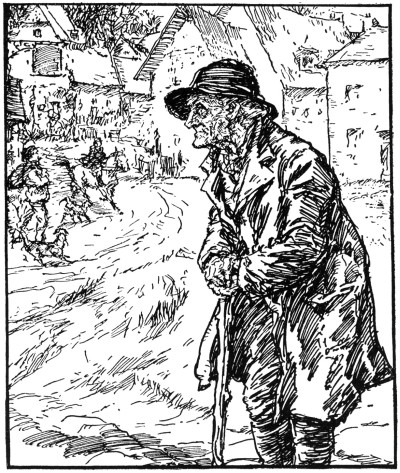 An old man with a gaunt, burnt face;
An old man with a gaunt, burnt face;
His eyes rapt back on some far place.
Then Thomas Copp, of Cowfoot's Wynd
Drove up; and stopped to take a glass.
"I hope they'll gallop on my grass,"
He said, "My little girl does sing
To see the red coats galloping.
It's good for grass, too, to be trodden
Except they poach it, where it's sodden."
Then Billy Waldrist, from the Lynn,
With Jockey Hill, from Pitts, came in
And had a sip of gin and stout
To help the jockey's sweatings out.
"Rare day for scent," the jockey said.
[Pg 18]
A pony, like a feather bed
On four short sticks, took place aside.
The little girl who rode astride
Watched everything with eyes that glowed
With glory in the horse she rode.
At half-past ten, some lads on foot
Came to be beaters to a shoot
Of rabbits at the Warren Hill.
Rough sticks they had, and Hob and Jill,
Their ferrets, in a bag, and netting.
They talked of dinner-beer and betting;
And jeered at those who stood around.
They rolled their dogs upon the ground
And teased them: "Rats," they cried; "go fetch."
"Go seek, good Roxer; 'z bite, good betch.
[Pg 19]
What dinner-beer'll they give us, lad?
Sex quarts the lot last year we had.
They'd ought to give us seven this.
Seek, Susan; what a betch it is."
[Pg 21]
THE CLERGYMAN
[Pg 23]
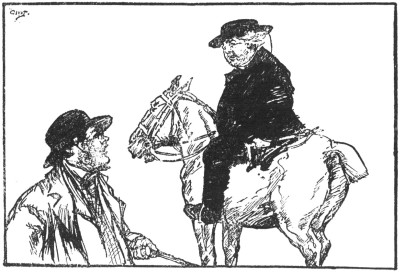
A pommle cob came trotting up,
Round-bellied like a drinking-cup,
Bearing on back a pommle man
Round-bellied like a drinking-can.
The clergyman from Condicote.
[Pg 24]
His face was scarlet from his trot,
His white hair bobbed about his head
As halos do round clergy dead.
He asked Tom Copp, "How long to wait?"
His loose mouth opened like a gate
To pass the wagons of his speech,
He had a mighty voice to preach,
Though indolent in other matters,
He let his children go in tatters.
His daughter Madge on foot, flushed-cheekt,
In broken hat and boots that leakt,
With bits of hay all over her,
Her plain face grinning at the stir
(A broad pale face, snub-nosed, with speckles
Of sandy eyebrows sprinkt with freckles)
[Pg 25]
Came after him and stood apart
Beside the darling of her heart,
Miss Hattie Dyce from Baydon Dean;
A big young fair one, chiselled clean,
Brow, chin, and nose, with great blue eyes,
All innocence and sweet surprise,
And golden hair piled coil on coil
Too beautiful for time to spoil.
They talked in undertones together
Not of the hunting, nor the weather.
Old Steven, from Scratch Steven Place
(A white beard and a rosy face),
Came next on his stringhalty grey,
"I've come to see the hounds away,"
He said, "And ride a field or two.
We old have better things to do
[Pg 26]
Than breaking all our necks for fun."
He shone on people like the sun,
And on himself for shining so.
Three men came riding in a row:—
John Pyn, a bull-man, quick to strike,
Gross and blunt-headed like a shrike
Yet sweet-voiced as a piping flute;
Tom See, the trainer, from the Toot,
[Pg 27]
Red, with an angry, puzzled face
And mouth twitched upward out of place,
Sucking cheap grapes and spitting seeds;
And Stone, of Bartle's Cattle Feeds,
A man whose bulk of flesh and bone
Made people call him Twenty Stone.
He was the man who stood a pull
At Tencombe with the Jersey bull
And brought the bull back to his stall.
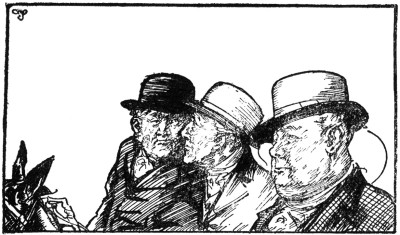
Some children ranged the tavern-wall,
Sucking their thumbs and staring hard;
Some grooms brought horses from the yard.
Jane Selbie said to Ellen Tranter,
"A lot on 'em come doggin', ant her?"
"A lot on 'em," said Ellen, "look
[Pg 28]
There'm Mister Gaunt of Water's Hook.
They say he" ... (whispered). "Law," said Jane.
Gaunt flung his heel across the mane,
And slithered from his horse and stamped.
"Boots tight," he said, "my feet are cramped."
A loose-shod horse came clicking clack;
Nick Wolvesey on a hired hack
Came tittup, like a cup and ball.
One saw the sun, moon, stars, and all
The great green earth twixt him and saddle;
Then Molly Wolvesey riding straddle,
Red as a rose, with eyes like sparks.
Two boys from college out for larks
Hunted bright Molly for a smile
But were not worth their quarry's while.
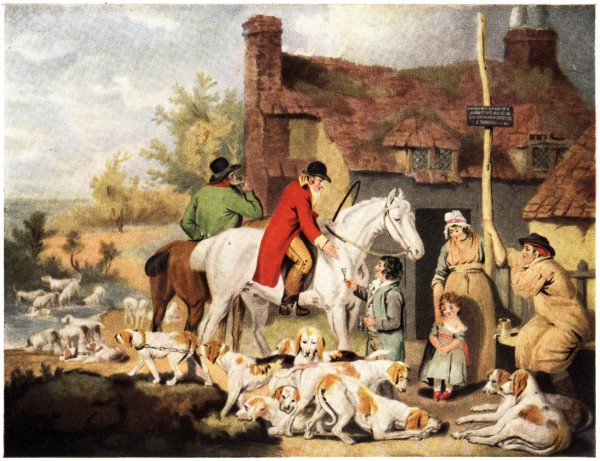 Courtesy Arthur Ackermann and Son, New York
Courtesy Arthur Ackermann and Son, New York
[Pg 29]
Two eyeglassed gunners dressed in tweed
Came with a spaniel on a lead
And waited for a fellow gunner.
The parson's son, the famous runner,
Came dressed to follow hounds on foot.
His knees were red as yew tree root
From being bare, day in day out;
He wore a blazer, and a clout
(His sweater's arms) tied round his neck.
His football shorts had many a speck
And splash of mud from many a fall
Got as he picked the slippery ball
Heeled out behind a breaking scrum.
He grinned at people, but was dumb,
Not like these lousy foreigners.
The otter-hounds and harriers
From Godstow to the Wye all knew him.
[Pg 31]
THE PARSON
[Pg 33]
And with him came the stock which grew him—
The parson and his sporting wife,
She was a stout one, full of life
With red, quick, kindly, manly face.
She held the knave, queen, king, and ace
In every hand she played with men.
She was no sister to the hen,
But fierce and minded to be queen.
She wore a coat and skirt of green,
Her waistcoat cut of bunting red,
Her tie pin was a fox's head.
The parson was a manly one,
His jolly eyes were bright with fun.
[Pg 34]
His jolly mouth was well inclined
To cry aloud his jolly mind
To everyone, in jolly terms.
He did not talk of churchyard worms,
But of our privilege as dust
To box a lively bout with lust
Ere going to Heaven to rejoice.
He loved the sound of his own voice.
His talk was like a charge of horse;
His build was all compact, for force,
Well-knit, well-made, well-coloured, eager,
He kept no Lent to make him meagre.
He loved his God, himself and man.
He never said "Life's wretched span;
This wicked world," in any sermon.
This body, that we feed the worm on,
[Pg 35]
To him, was jovial stuff that thrilled.
He liked to see the foxes killed;
But most he felt himself in clover
To hear "Hen left, hare right, cock over,"
At woodside, when the leaves are brown.
Some grey cathedral in a town
Where drowsy bells toll out the time
To shaven closes sweet with lime,
And wall-flower roots drive out of the mortar
All summer on the Norman Dortar,
Was certain some day to be his.
Nor would a mitre go amiss
To him, because he governed well.
His voice was like the tenor bell
When services were said and sung.
And he had read in many a tongue,
Arabic, Hebrew, Spanish, Greek.
[Pg 37]
"JILL AND JOAN"
[Pg 39]
Two bright young women, nothing meek,
Rode up on bicycles and propped
Their wheels in such wise that they dropped
To bring the parson's son to aid.
Their cycling suits were tailor-made,
Smart, mannish, pert, but feminine.
The colour and the zest of wine
Were in their presence and their bearing;
Like spring, they brought the thought of pairing.
The parson's lady thought them pert.
And they could mock a man and flirt,
Do billiard tricks with corks and pennies,
Sing ragtime songs and win at tennis
The silver-cigarette-case-prize.
[Pg 40]
They had good colour and bright eyes,
Bright hair, bright teeth and pretty skin,
On darkened stairways after dances,
Which many lads had longed to win.
Their reading was the last romances,
And they were dashing hockey players.
Men called them, "Jill and Joan, the slayers."
They were as bright as fresh sweet-peas.
[Pg 41]
FARMER BENNETT
[Pg 43]
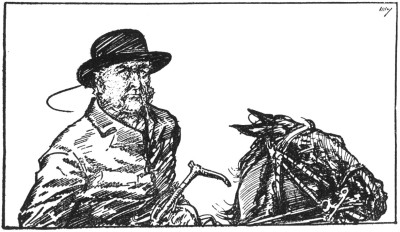
Old Farmer Bennett followed these
Upon his big-boned savage black
Whose mule-teeth yellowed to bite back
Whatever came within his reach.
Old Bennett sat him like a leech.
[Pg 44]
The grim old rider seemed to be
As hard about the mouth as he.
The beaters nudged each other's ribs
With "There he goes, his bloody Nibs.
He come on Joe and Anty Cop,
And beat 'em with his hunting crop
Like tho' they'd bin a sack of beans.
His pickers were a pack of queans,
And Joe and Anty took a couple,
He caught 'em there, and banged 'em supple.
Women and men, he didn't care
(He'd kill 'em some day, if he dare),
He beat the whole four nearly dead.
'I'll learn 'ee rabbit in my shed,
That's how my ricks get set afire.'
[Pg 45]
That's what he said, the bloody liar;
Old oaf, I'd like to burn his ricks,
Th' old swine's too free with fists and sticks.
He keeps that Mrs. Jones himselve."
Just like an axehead on its helve
Old Bennett sat and watched the gathering.
He'd given many a man a lathering
In field or barn, and women, too.
His cold eye reached the women through
With comment, and the men with scorn.
He hated women gently born;
He hated all beyond his grasp;
For he was minded like the asp
That strikes whatever is not dust.
[Pg 47]
THE GOLDEN AGE
[Pg 49]
Charles Copse, of Copse Hold Manor, thrust
Next into view. In face and limb
The beauty and the grace of him
Were like the golden age returned.
His grave eyes steadily discerned
The good in men and what was wise.
He had deep blue, mild-coloured eyes,
And shocks of harvest-coloured hair,
Still beautiful with youth. An air
Or power of kindness went about him;
No heart of youth could ever doubt him
Or fail to follow where he led.
He was a genius, simply bred,
And quite unconscious of his power.
[Pg 50]
He was the very red rose flower
Of all that coloured countryside.
Gauchos had taught him how to ride.
He knew all arts, but practised most
The art of bettering flesh and ghost
In men and lads down in the mud.
He knew no class in flesh and blood.
He loved his kind. He spent some pith
Long since, relieving Ladysmith.
Many a horse he trotted tame,
Heading commandos from their aim,
In those old days upon the veldt.
[Pg 51]
THE SQUIRE
[Pg 53]
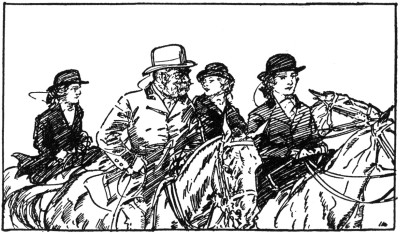
An old bear in a scarlet pelt
Came next, old Squire Harridew,
His eyebrows gave a man the grue
So bushy and so fierce they were;
He had a bitter tongue to swear.
A fierce, hot, hard, old, stupid squire,
[Pg 54]
With all his liver made of fire,
Small brain, great courage, mulish will.
The hearts in all his house stood still
When someone crossed the squire's path.
For he was terrible in wrath,
And smashed whatever came to hand.
Two things he failed to understand,
The foreigner and what was new.
His daughters, Carrie, Jane and Lu,
Rode with him, Carrie at his side.
His son, the ne'er-do-weel, had died
In Arizona, long before.
The Squire set the greatest store
By Carrie, youngest of the three,
And lovely to the blood was she;
[Pg 55]
Blonde, with a face of blush and cream,
And eyes deep violet in their gleam,
Bright blue when quiet in repose.
She was a very golden rose.
And many a man when sunset came
Would see the manor windows flame,
And think, "My beauty's home is there."
Queen Helen had less golden hair,
Queen Cleopatra paler lips,
Queen Blanche's eyes were in eclipse,
By golden Carrie's glancing by.
She had a wit for mockery
And sang mild, pretty senseless songs
Of sunsets, Heav'n and lover's wrongs,
Sweet to the Squire when he had dined.
A rosebud need not have a mind.
[Pg 56]
A lily is not sweet from learning.
Jane looked like a dark lantern, burning.
Outwardly dark, unkempt, uncouth,
But minded like the living truth,
A friend that nothing shook nor wearied.
She was not "Darling Jan'd," nor "dearie'd,"
She was all prickles to the touch,
So sharp, that many feared to clutch,
So keen, that many thought her bitter.
She let the little sparrows twitter.
She had a hard ungracious way.
Her storm of hair was iron-grey,
And she was passionate in her heart
For women's souls that burn apart,
Just as her mother's had, with Squire.
She gave the sense of smouldering fire.
[Pg 57]
She was not happy being a maid,
At home, with Squire, but she stayed
Enduring life, however bleak,
To guard her sisters who were weak,
And force a life for them from Squire.
And she had roused and stood his fire
A hundred times, and earned his hate,
To win those two a better state.
Long years before the Canon's son
Had cared for her, but he had gone
To Klondyke, to the mines, for gold,
To find, in some strange way untold
A foreign grave that no men knew.
No depth, nor beauty, was in Lu,
But charm and fun, for she was merry,
[Pg 58]
Round, sweet and little like a cherry,
With laughter like a robin's singing;
She was not kittenlike and clinging,
But pert and arch and fond of flirting,
In mocking ways that were not hurting,
And merry ways that women pardoned.
Not being married yet she gardened.
She loved sweet music; she would sing
Songs made before the German King
Made England German in her mind.
She sang "My lady is unkind,"
"The Hunt is up," and those sweet things
Which Thomas Campion set to strings,
"Thrice toss," and "What," and "Where are now?"
[Pg 59]
The next to come was Major Howe
Driv'n in a dog-cart by a groom.
The testy major was in fume
To find no hunter standing waiting;
The groom who drove him caught a rating,
The groom who had the horse in stable,
Was damned in half the tongues of Babel.
The Major being hot and heady
When horse or dinner was not ready.
He was a lean, tough, liverish fellow,
With pale blue eyes (the whites pale yellow),
Mustache clipped toothbrush-wise, and jaws
Shaved bluish like old partridge claws.
When he had stripped his coat he made
A speckless presence for parade,
New pink, white cords, and glossy tops
[Pg 60]
New gloves, the newest thing in crops,
Worn with an air that well expressed
His sense that no one else was dressed.
[Pg 61]
THE DOCTOR
[Pg 63]
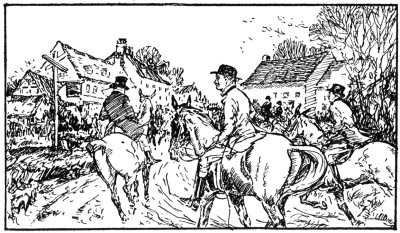
Quick trotting after Major Howe
Came Doctor Frome of Quickemshow,
A smiling silent man whose brain
Knew all of every secret pain
In every man and woman there.
[Pg 64]
Their inmost lives were all laid bare
To him, because he touched their lives
When strong emotions sharp as knives
Brought out what sort of soul each was.
As secret as the graveyard grass
He was, as he had need to be.
At some time he had had to see
Each person there, sans clothes, sans mask,
Sans lying even, when to ask
Probed a tamed spirit into truth.
Richard, his son, a jolly youth
Rode with him, fresh from Thomas's,
As merry as a yearling is
In maytime in a clover patch.
He was a gallant chick to hatch
Big, brown and smiling, blithe and kind,
[Pg 65]
With all his father's love of mind
And greater force to give it act.
To see him when the scrum was packt,
Heave, playing forward, was a sight.
His tackling was the crowd's delight
In many a danger close to goal.
The pride in the three quarter's soul
Dropped, like a wet rag, when he collared.
He was as steady as a bollard,
And gallant as a skysail yard.
He rode a chestnut mare which sparred.
In good St. Thomas' Hospital,
He was the crown imperial
Of all the scholars of his year.
The Harold lads, from Tencombe Weir,
Came all on foot in corduroys,
[Pg 66]
Poor widowed Mrs. Harold's boys,
Dick, Hal and Charles, whose father died.
(Will Masemore shot him in the side
By accident at Masemore Farm.
A hazel knocked Will Masemore's arm
In getting through a hedge; his gun
Was not half-cocked, so it was done
And those three boys left fatherless.)
Their gaitered legs were in a mess
With good red mud from twenty ditches
Hal's face was plastered like his breeches,
Dick chewed a twig of juniper.
They kept at distance from the stir
Their loss had made them lads apart.
Next came the Colway's pony cart
From Coln St. Evelyn's with the party,
[Pg 67]
Hugh Colway jovial, bold and hearty,
And Polly Colway's brother, John
(Their horses had been both sent on)
And Polly Colway drove them there.
Poor pretty Polly Colway's hair.
The grey mare killed her at the brook
Down Seven Springs Mead at Water Hook,
Just one month later, poor sweet woman.
[Pg 69]
THE SAILOR
[Pg 71]
Her brother was a rat-faced Roman,
Lean, puckered, tight-skinned from the sea,
Commander in the Canace,
Able to drive a horse, or ship,
Or crew of men, without a whip
By will, as long as they could go.
His face would wrinkle, row on row,
From mouth to hair-roots when he laught
He looked ahead as though his craft
Were with him still, in dangerous channels.
He and Hugh Colway tossed their flannels
Into the pony-cart and mounted.
Six foiled attempts the watchers counted,
[Pg 72]
The horses being bickering things,
That so much scarlet made like kings,
Such sidling and such pawing and shifting.
[Pg 73]
THE MERCHANT'S SON
[Pg 75]
When Hugh was up his mare went drifting
Sidelong and feeling with her heels
For horses' legs and poshay wheels,
While lather creamed her neat clipt skin.
Hugh guessed her foibles with a grin.
He was a rich town-merchant's son,
A wise and kind man fond of fun,
Who loved to have a troop of friends
At Coln St. Eves for all week-ends,
And troops of children in for tea,
He gloried in a Christmas Tree.
And Polly was his heart's best treasure,
And Polly was a golden pleasure
To everyone, to see or hear.
[Pg 76]
Poor Polly's dying struck him queer,
He was a darkened man thereafter,
Cowed silent, he would wince at laughter
And be so gentle it was strange
Even to see. Life loves to change.
Now Coln St. Evelyn's hearths are cold
The shutters up, the hunters sold,
And green mould damps the locked front door.
But this was still a month before,
And Polly, golden in the chaise,
Still smiled, and there were golden days,
Still thirty days, for those dear lovers.
[Pg 77]
SPORTSMAN
[Pg 79]
The Riddens came, from Ocle Covers,
Bill Ridden riding Stormalong,
(By Tempest out of Love-me-long)
A proper handful of a horse,
That nothing but the Aintree course
Could bring to terms, save Bill perhaps.
All sport, from bloody war to craps,
Came well to Bill, that big-mouthed smiler;
They nick-named him "the mug-beguiler,"
For Billy lived too much with horses
In coper's yards and sharper's courses,
To lack the sharper-coper streak.
He did not turn the other cheek
When struck (as English Christians do),
[Pg 81]
He boxed like a Whitechapel Jew,
And many a time his knuckles bled
Against a race-course-gipsy's head.
For "hit him first and argue later"
Was truth at Billy's alma mater,
Not love, not any bosh of love.
His hand was like a chamois glove
And riding was his chief delight.
He bred the chaser Chinese-white,
From Lilybud by Mandarin.
And when his mouth tucked corners in,
And scent was high and hounds were going,
He went across a field like snowing
And tackled anything that came.
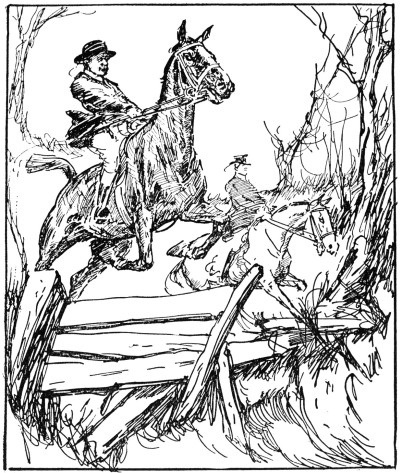 All sport, from bloody war to craps,
All sport, from bloody war to craps,
Came well to Bill, that big-mouthed smiler.
His wife, Sal Ridden, was the same,
A loud, bold, blonde abundant mare,
[Pg 82]
With white horse teeth and stooks of hair,
(Like polished brass) and such a manner
It flaunted from her like a banner.
Her father was Tom See the trainer;
She rode a lovely earth-disdainer
Which she and Billy wished to sell.
Behind them rode her daughter Bell,
A strange shy lovely girl whose face
[Pg 83]
Was sweet with thought and proud with race,
And bright with joy at riding there.
She was as good as blowing air
But shy and difficult to know.
The kittens in the barley-mow,
The setter's toothless puppies sprawling,
The blackbird in the apple calling,
All knew her spirit more than we,
So delicate these maidens be
In loving lovely helpless things.
The Manor set, from Tencombe Rings,
Came, with two friends, a set of six.
Ed Manor with his cockerel chicks,
Nob, Cob and Bunny as they called them,
(God help the school or rule which galled them;
They carried head) and friends from town.
[Pg 84]
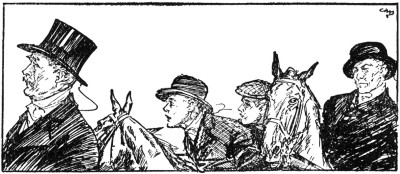
Ed Manor trained on Tencombe Down.
He once had been a famous bat,
He had that stroke, "the Manor-pat,"
Which snicked the ball for three, past cover.
He once scored twenty in an over,
But now he cricketed no more.
He purpled in the face and swore
At all three sons, and trained, and told
Long tales of cricketing of old,
When he alone had saved his side.
[Pg 85]
Drink made it doubtful if he lied,
Drink purpled him, he could not face
The fences now, nor go the pace
He brought his friends to meet; no more.
His big son Nob, at whom he swore,
Swore back at him, for Nob was surly,
Tall, shifty, sullen-smiling, burly,
Quite fearless, built with such a jaw
That no man's rule could be his law
Nor any woman's son his master.
Boxing he relished. He could plaster
All those who boxed out Tencombe way.
A front tooth had been knocked away
Two days before, which put his mouth
A little to the east of south.
And put a venom in his laughter.
[Pg 86]
Cob was a lighter lad, but dafter;
Just past eighteen, while Nob was twenty.
Nob had no nerves but Cob had plenty
So Cobby went where Nobby led.
He had no brains inside his head,
Was fearless, just like Nob, but put
Some clog of folly round his foot,
Where Nob put will of force or fraud;
He spat aside and muttered Gawd
When vext; he took to whiskey kindly
And loved and followed Nobby blindly,
And rode as in the saddle born.
Bun looked upon the two with scorn.
He was the youngest, and was wise.
He too was fair, with sullen eyes,
[Pg 87]
He too (a year before) had had
A zest for going to the bad,
With Cob and Nob. He knew the joys
Of drinking with the stable-boys,
Or smoking while he filled his skin
With pints of Guinness dashed with gin
And Cobby yelled a bawdy ditty,
Or cutting Nobby for the kitty,
And damning peoples' eyes and guts,
Or drawing evening-church for sluts,
He knew them all and now was quit.
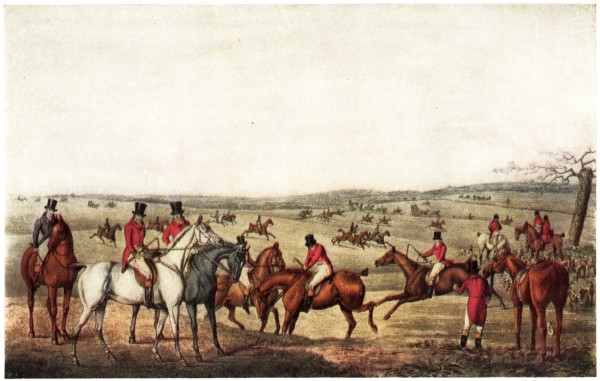 Courtesy Arthur Ackermann and Son, New York
Courtesy Arthur Ackermann and Son, New York
Sweet Polly Colway managed it.
And Bunny changed. He dropped his drink
(The pleasant pit's seductive brink),
He started working in the stable,
[Pg 88]
And well, for he was shrewd and able.
He left the doubtful female friends
Picked up at Evening-Service ends,
He gave up cards and swore no more.
Nob called him "the Reforming Whore,"
"The Soul's Awakening," or "The Text,"
Nob being always coarse when vext.
Ed Manor's friends were Hawke and Sladd,
Old college friends, the last he had,
Rare horsemen, but their nerves were shaken
By all the whiskey they had taken.
Hawke's hand was trembling on his rein.
His eyes were dead-blue like a vein,
His peaked sad face was touched with breeding,
His querulous mind was quaint from reading,
[Pg 89]
His piping voice still quirked with fun.
Many a mad thing he had done,
Riding to hounds and going to races.
A glimmer of the gambler's graces,
Wit, courage, devil, touched his talk.
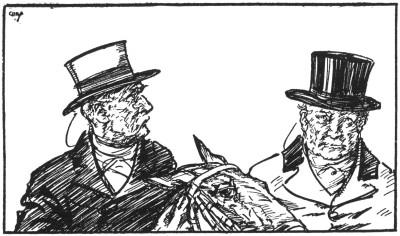
Sladd's big fat face was white as chalk,
His mind went wondering, swift yet solemn,
[Pg 90]
Twixt winning-post and betting column,
The weights and forms and likely colts.
He said "This road is full of jolts.
I shall be seasick riding here.
O damn last night with that liqueur."
Len Stokes rode up on Peterkin;
He owned the Downs by Baydon Whin;
And grazed some thousand sheep; the boy
Grinned round at men with jolly joy
At being alive and being there.
His big round face and mop of hair
Shone, his great teeth shone in his grin,
The clean blood in his clear tanned skin
Ran merry, and his great voice mocked
His young friends present till they rocked.
[Pg 91]
Steer Harpit came from Rowell Hill,
A small, frail man, all heart and will,
A sailor as his voice betrayed.
He let his whip-thong droop and played
At snicking off the grass-blades with it,
John Hankerton, from Compton Lythitt,
Was there with Pity Hankerton,
And Mike, their good-for-little son,
Back, smiling, from his seventh job.
Joan Urch was there upon her cob.
Tom Sparsholt on his lanky grey.
John Restrop from Hope Goneaway.
And Vaughan, the big black handsome devil,
Loose-lipped with song and wine and revel
All rosy from his morning tub
[Pg 93]
THE EXQUISITE
[Pg 95]
The Godsdown tigress with her cub
(Lady and Tommy Crowmarsh) came.
The great eyes smouldered in the dame,
Wit glittered, too, which few men saw.
There was more beauty there than claw.
Tommy in bearing, horse and dress
Was black, fastidious, handsomeness,
Choice to his trimmed soul's fingertips.
Heredia's sonnets on his lips.
A line undrawn, a plate not bitten,
A stone uncut, a phrase unwritten,
That would be perfect, made his mind.
A choice pull, from a rare print, signed,
Was Tommy. He collected plate,
[Pg 97]
(Old sheffield) and he owned each state
Of all the Meryon Paris etchings.
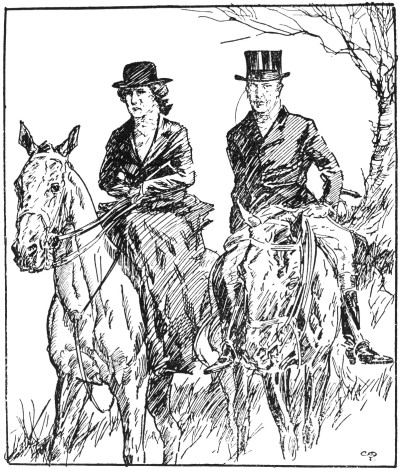 The Godsdown Tigress with her cub
The Godsdown Tigress with her cub
(Lady and Tommy Crowmarsh) came.
Colonel Sir Button Budd of Fletchings
Was there; Long Robert Thrupp was there,
(Three yards of him men said there were),
Long as the King of Prussia's fancy.
He rode the longlegged Necromancy,
A useless racehorse that could canter.
George Childrey with his jolly banter
Was there, Nick Childrey, too, come down
The night before from London town,
To hunt and have his lungs blown clean.
The Ilsley set from Tuttocks Green
Was there (old Henry Ilsley drove),
Carlotta Ilsley brought her love
[Pg 98]
A flop-jowled broker from the city.
Men pitied her, for she was pretty.
Some grooms and second horsemen mustered.
A lot of men on foot were clustered
Round the inn-door, all busy drinking,
One heard the kissing glasses clinking
In passage as the tray was brought.
Two terriers (which they had there) fought
There on the green, a loud, wild whirl.
Bell stopped them like a gallant girl.
The hens behind the tavern clucked.
[Pg 99]
THE SOLDIER
[Pg 101]
Then on a horse which bit and bucked
(The half-broke four-year-old Marauder)
Came Minton-Price of th' Afghan border,
Lean, puckered, yellowed, knotted, scarred,
Tough as a hide-rope twisted hard,
[Pg 102]
Tense tiger-sinew knit to bone.
Strange-wayed from having lived alone
With Kafir, Afghan and Beloosh
In stations frozen in the Koosh
Where nothing but the bullet sings.
His mind had conquered many things,
Painting, mechanics, physics, law,
White-hot, hand-beaten things to draw
Self-hammered from his own soul's stithy,
His speech was blacksmith-sparked and pithy.
Danger had been his brother bred;
The stones had often been his bed
In bickers with the border-thieves.
[Pg 103]
THE COUNTRY'S HOPE
[Pg 105]
A chestnut mare with swerves and heaves
Came plunging, scattering all the crowd,
She tossed her head and laughed aloud
And bickered sideways past the meet.
From pricking ears to mincing feet
She was all tense with blood and quiver,
You saw her clipt hide twitch and shiver
Over her netted cords of veins.
She carried Cothill, of the Sleins;
A tall, black, bright-eyed handsome lad.
Great power and great grace he had.
Men hoped the greatest things of him,
His grace made people think him slim,
But he was muscled like a horse
[Pg 106]
A sculptor would have wrought his torse
In bronze or marble for Apollo.
He loved to hurry like a swallow
For miles on miles of short-grassed sweet
Blue-harebelled downs where dewy feet
Of pure winds hurry ceaselessly.
He loved the downland like a sea,
The downland where the kestrels hover;
The downland had him for a lover.
And every other thing he loved
In which a clean free spirit moved.
So beautiful, he was, so bright.
He looked to men like young delight
Gone courting April maidenhood,
That has the primrose in her blood,
He on his mincing lady mare.
[Pg 107]
COUNTRYMEN
[Pg 109]
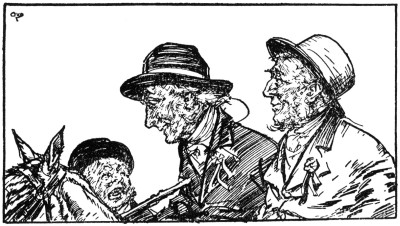
Ock Gurney and old Pete were there,
Riding their bonny cobs and swearing.
Ock's wife had giv'n them both a fairing,
A horse-rosette, red, white and blue.
Their cheeks were brown as any brew,
And every comer to the meet
[Pg 110]
Said "Hello, Ock," or "Morning, Pete;
Be you a going to a wedding?"
"Why, noa," they said, "we'm going a bedding;
Now ben't us, uncle, ben't us, Ock?"
Pete Gurney was a lusty cock
Turned sixty-three, but bright and hale,
A dairy-farmer in the vale,
Much like a robin in the face,
Much character in little space,
With little eyes like burning coal.
His mouth was like a slit or hole
In leather that was seamed and lined.
He had the russet-apple mind
That betters as the weather worsen.
He was a manly English person,
Kind to the core, brave, merry, true;
[Pg 111]
One grief he had, a grief still new,
That former Parson joined with Squire
In putting down the Playing Quire,
In church, and putting organ in.
"Ah, boys, that was a pious din
That Quire was; a pious praise
The noise was that we used to raise;
I and my serpent, George with his'n,
On Easter Day in He is Risen,
Or blessed Christmas in Venite;
And how the trombone came in mighty,
In Alleluias from the heart.
Pious, for each man played his part,
Not like 'tis now." Thus he, still sore
For changes forty years before,
When all (that could) in time and tune,
[Pg 112]
Blew trumpets to the newë moon.
He was a bachelor, from choice.
He and his nephew farmed the Boyce
Prime pasture land for thirty cows.
Ock's wife, Selina Jane, kept house,
And jolly were the three together.
Ock had a face like summer weather,
A broad red sun, split by a smile.
He mopped his forehead all the while,
And said "By damn," and "Ben't us, Unk?"
His eyes were close and deeply sunk.
He cursed his hunter like a lover,
"Now blast your soul, my dear, give over.
Woa, now, my pretty, damn your eyes."
Like Pete he was of middle size,
Dean-oak-like, stuggy, strong in shoulder,
[Pg 113]
He stood a wrestle like a boulder,
He had a back for pitching hay.
His singing voice was like a bay.
In talk he had a sideways spit,
Each minute, to refresh his wit.
He cracked Brazil nuts with his teeth.
He challenged Cobbett of the Heath
(Weight-lifting champion) once, but lost.
Hunting was what he loved the most,
Next to his wife and Uncle Pete.
With beer to drink and cheese to eat,
And rain in May to fill the grasses,
This life was not a dream that passes
To Ock, but like the summer flower.
[Pg 115]
THE HOUNDS
[Pg 117]
But now the clock had struck the hour,
And round the corner, down the road
The bob-bob-bobbing serpent flowed
With three black knobs upon its spine;
Three bobbing black-caps in a line.
A glimpse of scarlet at the gap
Showed underneath each bobbing cap,
And at the corner by the gate,
One heard Tom Dansey give a rate,
"Hep, Drop it, Jumper; have a care,"
There came a growl, half-rate, half-swear,
A spitting crack, a tuneful whimper
And sweet religion entered Jumper.
[Pg 118]
There was a general turn of faces,
The men and horses shifted places,
And round the corner came the hunt,
Those feathery things, the hounds, in front,
Intent, wise, dipping, trotting, straying,
Smiling at people, shoving, playing,
Nosing to children's faces, waving
Their feathery sterns, and all behaving,
One eye to Dansey on Maroon.
Their padding cat-feet beat a tune,
And though they trotted up so quiet
Their noses brought them news of riot,
Wild smells of things with living blood,
Hot smells, against the grippers good,
Of weasel, rabbit, cat and hare,
Whose feet had been before them there,
[Pg 119]
Whose taint still tingled every breath;
But Dansey on Maroon was death,
So, though their noses roved, their feet
Larked and trit-trotted to the meet.
Bill Tall and Ell and Mirtie Key
(Aged fourteen years between the three)
Were flooded by them at the bend,
They thought their little lives would end,
For grave sweet eyes looked into theirs,
Cold noses came, and clean short hairs
And tails all crumpled up like ferns,
A sea of moving heads and sterns,
All round them, brushing coat and dress;
One paused, expecting a caress.
The children shrank into each other,
[Pg 121]
Shut eyes, clutched tight and shouted "Mother"
With mouths wide open, catching tears.
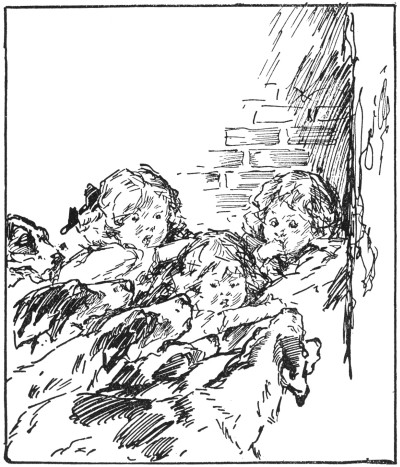 A sea of moving heads and sterns,
A sea of moving heads and sterns,
All round them, brushing coat and dress.
Sharp Mrs. Tall allayed their fears,
"Err out the road, the dogs won't hurt 'ee.
There now, you've cried your faces dirty.
More cleaning up for me to do.
What? Cry at dogs, great lumps like you?"
She licked her handkerchief and smeared
Their faces where the dirt appeared.
The hunt trit-trotted to the meeting,
Tom Dansey touching cap to greeting,
Slow-lifting crop-thong to the rim,
No hunter there got more from him
Except some brightening of the eye.
[Pg 122]
He halted at the Cock and Pye,
The hounds drew round him on the green,
Arrogant, Daffodil and Queen,
Closest, but all in little space.
Some lolled their tongues, some made grimace,
Yawning, or tilting nose in quest,
All stood and looked about with zest,
They were uneasy as they waited.
Their sires and dams had been well-mated,
They were a lovely pack for looks;
Their forelegs drumsticked without crooks,
Straight, without overtread or bend,
Muscled to gallop to the end,
With neat feet round as any cat's.
Great chested, muscled in the slats,
Bright, clean, short-coated, broad in shoulder,
With stag-like eyes that seemed to smoulder.
[Pg 123]
The heads well-cocked, the clean necks strong;
Brows broad, ears close, the muzzles long;
And all like racers in the thighs;
Their noses exquisitely wise,
Their minds being memories of smells;
Their voices like a ring of bells;
Their sterns all spirit, cock and feather;
Their colours like the English weather,
Magpie and hare, and badger-pye,
Like minglings in a double dye,
Some smutty-nosed, some tan, none bald;
Their manners were to come when called,
Their flesh was sinew knit to bone,
Their courage like a banner blown.
Their joy, to push him out of cover,
And hunt him till they rolled him over.
They were as game as Robert Dover.
[Pg 125]
THE WHIP
[Pg 127]
Tom Dansey was a famous whip
Trained as a child in horsemanship.
Entered, as soon as he was able,
As boy at Caunter's racing stable;
There, like the other boys, he slept
In stall beside the horse he kept,
Snug in the straw; and Caunter's stick
Brought morning to him all too quick.
He learned the high quick gingery ways
Of thoroughbreds; his stable days
Made him a rider, groom and vet.
He promised to be too thickset
For jockeying, so left it soon.
Now he was whip and rode Maroon.
[Pg 128]
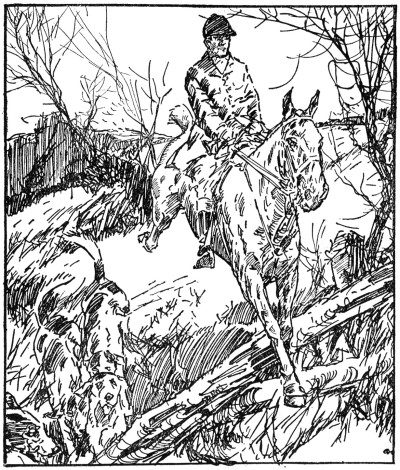 His chief delight
His chief delight
Was hunting fox from noon to night.
[Pg 129]
He was a small, lean, wiry man
With sunk cheeks weathered to a tan
Scarred by the spikes of hawthorn sprays
Dashed thro', head down, on going days,
In haste to see the line they took.
There was a beauty in his look,
It was intent. His speech was plain.
Maroon's head, reaching to the rein,
Had half his thought before he spoke.
His "gone away," when foxes broke,
Was like a bell. His chief delight
Was hunting fox from noon to night.
His pleasure lay in hounds and horses,
He loved the Seven Springs water-courses,
Those flashing brooks (in good sound grass,
Where scent would hang like breath on glass).
[Pg 130]
He loved the English countryside;
The wine-leaved bramble in the ride,
The lichen on the apple-trees,
The poultry ranging on the lees,
The farms, the moist earth-smelling cover,
His wife's green grave at Mitcheldover,
Where snowdrops pushed at the first thaw.
Under his hide his heart was raw
With joy and pity of these things.
The second whip was Kitty Myngs,
Still but a lad but keen and quick
(Son of old Myngs who farmed the Wick),
A horse-mouthed lad who knew his work.
He rode the big black horse, the Turk,
And longed to be a huntsman bold.
He had the horse-look, sharp and old,
With much good-nature in his face.
[Pg 131]
His passion was to go the pace
His blood was crying for a taming.
He was the Devil's chick for gaming,
He was a rare good lad to box.
He sometimes had a main of cocks
Down at the Flags. His job with hounds
At present kept his blood in bounds
From rioting and running hare.
Tom Dansey made him have a care.
He worshipped Dansey heart and soul.
To be a huntsman was his goal.
To be with hounds, to charge full tilt
Blackthorns that made the gentry wilt
Was his ambition and his hope.
He was a hot colt needing rope,
He was too quick to speak his passion
To suit his present huntsman's fashion.
[Pg 133]
THE HUNTSMAN
[Pg 135]
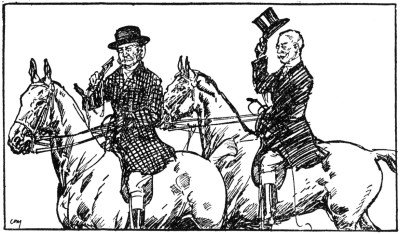
The huntsman, Robin Dawe, looked round,
He sometimes called a favourite hound,
Gently, to see the creature turn
Look happy up and wag his stern.
He smiled and nodded and saluted,
To those who hailed him, as it suited.
[Pg 136]
And patted Pip's, his hunter's neck.
His new pink was without a speck;
He was a red-faced smiling fellow,
His voice clear tenor, full and mellow,
His eyes, all fire, were black and small.
He had been smashed in many a fall.
His eyebrow had a white curved mark
Left by the bright shoe of The Lark,
Down in a ditch by Seven Springs.
His coat had all been trod to strings,
His ribs laid bare and shoulder broken
Being jumped on down at Water's Oaken,
The time his horse came down and rolled.
His face was of the country mould
Such as the mason sometimes cutted
On English moulding-ends which jutted
[Pg 137]
Out of the church walls, centuries since.
And as you never know the quince,
How good he is, until you try,
So, in Dawe's face, what met the eye
Was only part, what lay behind
Was English character and mind.
Great kindness, delicate sweet feeling,
(Most shy, most clever in concealing
Its depth) for beauty of all sorts,
Great manliness and love of sports,
A grave wise thoughtfulness and truth,
A merry fun, outlasting youth,
A courage terrible to see
And mercy for his enemy.
He had a clean-shaved face, but kept
[Pg 138]
A hedge of whisker neatly clipt,
A narrow strip or picture frame
(Old Dawe, the woodman, did the same),
Under his chin from ear to ear.
[Pg 139]
THE MASTER
[Pg 141]
But now the resting hounds gave cheer,
Joyful and Arrogant and Catch-him,
Smelt the glad news and ran to snatch him,
The Master's dogcart turned the bend.
Damsel and Skylark knew their friend;
A thrill ran through the pack like fire,
And little whimpers ran in quire.
The horses cocked and pawed and whickered,
Young Cothill's chaser kicked and bickered,
And stood on end and struck out sparks.
Joyful and Catch-him sang like larks,
There was the Master in the trap,
Clutching old Roman in his lap,
Old Roman, crazy for his brothers,
[Pg 142]
And putting frenzy in the others,
To set them at the dogcart wheels,
With thrusting heads and little squeals.
The Master put old Roman by,
And eyed the thrusters heedfully,
He called a few pet hounds and fed
Three special friends with scraps of bread,
Then peeled his wraps, climbed down and strode
Through all those clamourers in the road,
Saluted friends, looked round the crowd,
Saw Harridew's three girls and bowed,
Then took White Rabbit from the groom.
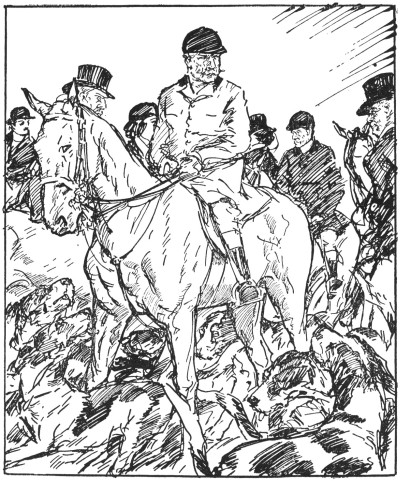 He had a welcome and salute
He had a welcome and salute
For all, on horse or wheel or foot.
He was Sir Peter Bynd, of Coombe;
Past sixty now, though hearty still,
[Pg 143]
A living picture of good-will,
An old, grave soldier, sweet and kind,
A courtier with a knightly mind,
Who felt whatever thing he thought.
His face was scarred, for he had fought
Five wars for us. Within his face
Courage and power had their place,
Rough energy, decision, force.
He smiled about him from his horse.
He had a welcome and salute
For all, on horse or wheel or foot,
Whatever kind of life each followed.
His tanned, drawn cheeks looked old and hollowed,
But still his bright blue eyes were young,
And when the pack crashed into tongue,
And staunch White Rabbit shook like fire,
[Pg 145]
He sent him at it like a flier,
And lived with hounds while horses could.
"They'm lying in the Ghost Heath Wood,
Sir Peter," said an earth-stopper,
(Old Baldy Hill), "You'll find 'em there.
'Z I come'd across I smell 'em plain.
There's one up back, down Tuttock's drain,
But, Lord, it's just a bog, the Tuttocks,
Hounds would be swallered to the buttocks.
Heath Wood, Sir Peter's best to draw."
[Pg 147]
THE START
[Pg 149]
Sir Peter gave two minutes' law
For Kingston Challow and his daughter;
He said, "They're late. We'll start the slaughter.
Ghost Heath, then, Dansey. We'll be going."
Now, at his word, the tide was flowing
Off went Maroon, off went the hounds,
Down road, then off, to Chols Elm Grounds,
Across soft turf with dead leaves cleaving
And hillocks that the mole was heaving.
Mild going to those trotting feet.
After the scarlet coats, the meet
[Pg 150]
Came clopping up the grass in spate;
They poached the trickle at the gate;
Their horses' feet sucked at the mud;
Excitement in the horses' blood,
Cocked forward every ear and eye;
They quivered as the hounds went by,
They trembled when they first trod grass;
They would not let another pass,
They scattered wide up Chols Elm Hill.
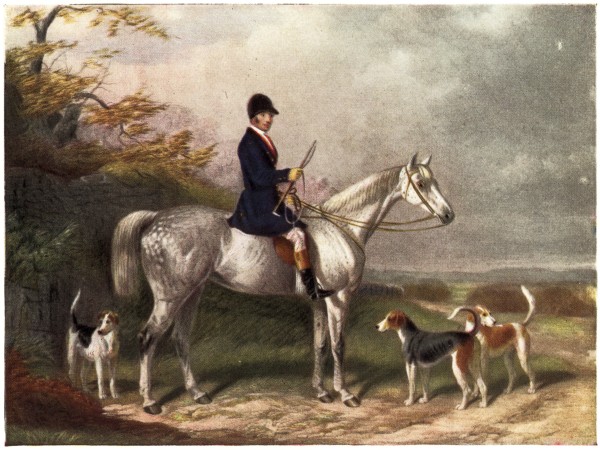 Courtesy Arthur Ackermann and Son, New York
Courtesy Arthur Ackermann and Son, New York
The wind was westerly but still;
The sky a high fair-weather cloud,
Like meadows ridge-and-furrow ploughed,
Just glinting sun but scarcely moving.
Blackbirds and thrushes thought of loving,
Catkins were out; the day seemed tense
[Pg 151]
It was so still. At every fence
Cow-parsley pushed its thin green fern.
White-violet-leaves shewed at the burn.
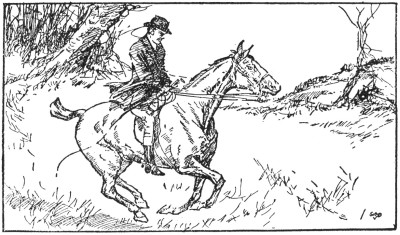
Young Cothill let his chaser go
Round Chols Elm Field a turn or so
To soothe his edge. The riders went
Chatting and laughing and content
[Pg 152]
In groups of two or three together.
The hounds, a flock of shaking feather,
Bobbed on ahead, past Chols Elm Cop.
The horses' shoes went clip-a-clop,
Along the stony cart-track there.
The little spinney was all bare,
But in the earth-moist winter day
The scarlet coats twixt tree and spray,
The glistening horses pressing on,
The brown faced lads, Bill, Dick and John,
And all the hurry to arrive,
Were beautiful, like Spring alive.
The hounds melted away with Master
The tanned lads ran, the field rode faster,
The chatter joggled in the throats
Of riders bumping by like boats,
[Pg 154]
"We really ought to hunt a bye day."
"Fine day for scent," "A fly or die day."
"They chopped a bagman in the check,
He had a collar round his neck."
"Old Ridden's girl's a pretty flapper."
"That Vaughan's a cad, the whipper-snapper."
"I tell 'ee, lads, I seed 'em plain,
Down in the Rough at Shifford's Main,
Old Squire stamping like a Duke,
So red with blood I thought he'd puke,
In appleplexie, as they do.
Miss Jane stood just as white as dew,
And heard him out in just white heat,
And then she trimmed him down a treat,
About Miss Lou it was, or Carrie
(She'd be a pretty peach to marry)."
[Pg 155]
"Her'll draw up-wind, so us'll go
Down by the furze, we'll see 'em so."
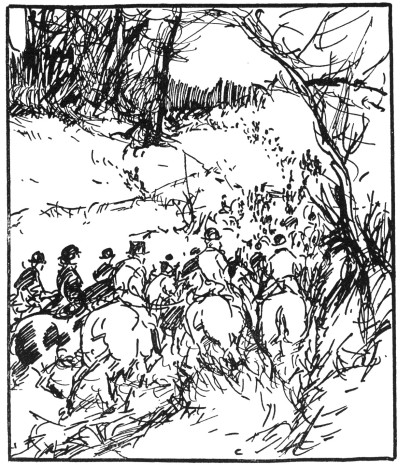 The scarlet coats twixt tree and spray,
The scarlet coats twixt tree and spray,
The glistening horses pressing on,
·······
And all the hurry to arrive,
Were beautiful, like Spring alive.
"Look, there they go, lad."
There they went,
Across the brook and up the bent,
Past Primrose Wood, past Brady Ride,
Along Ghost Heath to cover side.
The bobbing scarlet, trotting pack,
Turf scatters tossed behind each back,
Some horses blowing with a whinny,
A jam of horses in the spinney,
Close to the ride-gate; leather straining,
Saddles all creaking; men complaining,
Chaffing each other as they pass't,
[Pg 156]
On Ghost Heath turf they trotted fast.
Now as they neared the Ghost Heath Wood
Some riders grumbled, "What's the good:
It's shot all day and poached all night.
We shall draw blank and lose the light,
And lose the scent, and lose the day.
Why can't he draw Hope Goneaway,
Or Tuttocks Wood, instead of this?
There's no fox here, there never is."
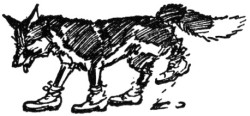
But as he trotted up to cover,
Robin was watching to discover
What chance there was, and many a token
Told him, that though no hound had spoken,
[Pg 157]
Most of them stirred to something there.
The old hounds' muzzles searched the air,
Thin ghosts of scents were in their teeth,
From foxes which had crossed the Heath
Not very many hours before.
"We'll find," he said, "I'll bet a score."
Along Ghost Heath they trotted well,
The hoof-cuts made the bruised earth smell,
The shaken brambles scattered drops,
Stray pheasants kukkered out of copse,
Cracking the twigs down with their knockings
And planing out of sight with cockings;
A scut or two lopped white to bramble.
[Pg 159]
"COVER"
[Pg 161]
And now they gathered to the gamble
At Ghost Heath Wood on Ghost Heath Down,
The hounds went crackling through the brown
Dry stalks of bracken killed by frost.
The wood stood silent in its host
Of halted trees all winter bare.
The boughs, like veins that suck the air,
Stretched tense, the last leaf scarcely stirred.
There came no song from any bird;
The darkness of the wood stood still
Waiting for fate on Ghost Heath Hill.
The whips crept to the sides to view;
The Master gave the nod, and "Leu,
Leu in, Ed-hoick, Ed-hoick, Leu in,"
[Pg 163]
Went Robin, cracking through the whin
And through the hedge-gap into cover.
The binders crashed as hounds went over,
And cock-cock-cock the pheasants rose.
Then up went stern and down went nose,
And Robin's cheerful tenor cried,
Through hazel-scrub and stub and ride,
"O wind him, beauties, push him out,
Yooi, onto him, Yahout, Yahout,
O push him out, Yooi, wind him, wind him."
The beauties burst the scrub to find him,
They nosed the warren's clipped green lawn,
The bramble and the broom were drawn,
The covert's northern end was blank.
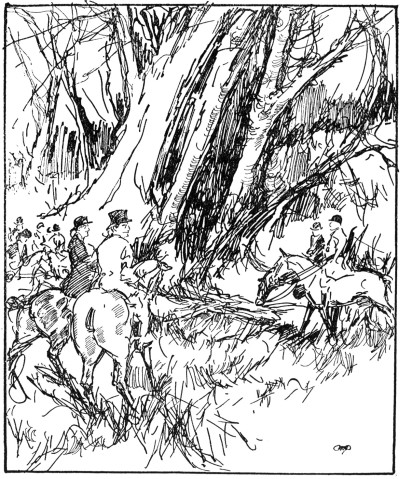 And now they gathered to the gamble
And now they gathered to the gamble
At Ghost Heath Wood on Ghost Heath Down.
They turned to draw along the bank
Through thicker cover than the Rough
[Pg 164]
Through three-and-four-year understuff
Where Robin's forearm screened his eyes.
"Yooi, find him, beauties," came his cries.
"Hark, hark to Daffodil," the laughter
Faln from his horn, brought whimpers after,
For ends of scents were everywhere.
He said, "This Hope's a likely lair.
And there's his billets, grey and furred.
And George, he's moving, there's a bird."
A blue uneasy jay was chacking.
(A swearing screech, like tearing sacking)
From tree to tree, as in pursuit,
He said "That's it. There's fox afoot.
And there, they're feathering, there she speaks.
Good Daffodil, good Tarrybreeks,
[Pg 165]
Hark there, to Daffodil, hark, hark."
The mild horn's note, the soft flaked spark
Of music, fell on that rank scent.
From heart to wild heart magic went.
The whimpering quivered, quavered, rose.
"Daffodil has it. There she goes.
O hark to her." With wild high crying
From frantic hearts, the hounds went flying
To Daffodil for that rank taint.
A waft of it came warm but faint,
In Robin's mouth, and faded so.
"First find a fox, then let him go,"
Cried Robin Dawe. "For any sake.
Ring, Charley, till you're fit to break."
He cheered his beauties like a lover
And charged beside them into cover.
[Pg 167]
PART TWO—THE FOX
[Pg 169]
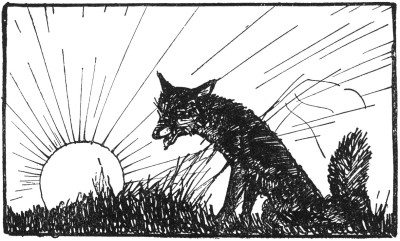
On old Cold Crendon's windy tops
Grows wintrily Blown Hilcote Copse,
Wind-bitten beech with badger barrows,
Where brocks eat wasp-grubs with their marrows,
And foxes lie on short-grassed turf,
Nose between paws, to hear the surf
Of wind in the beeches drowsily.
There was our fox bred lustily
Three years before, and there he berthed
[Pg 170]
Under the beech-roots snugly earthed,
With a roof of flint and a floor of chalk
And ten bitten hens' heads each on its stalk,
Some rabbits' paws, some fur from scuts,
A badger's corpse and a smell of guts.
And there on the night before my tale
He trotted out for a point in the vale.
He saw, from the cover edge, the valley
Go trooping down with its droops of sally
To the brimming river's lipping bend,
And a light in the inn at Water's End.
He heard the owl go hunting by
And the shriek of the mouse the owl made die,
And the purr of the owl as he tore the red
Strings from between his claws and fed;
The smack of joy of the horny lips
[Pg 171]
Marbled green with the blobby strips.
He saw the farms where the dogs were barking,
Cold Crendon Court and Copsecote Larking;
The fault with the spring as bright as gleed,
Green-slash-laced with water weed.
A glare in the sky still marked the town,
Though all folk slept and the blinds were down,
The street lamps watched the empty square,
The night-cat sang his evil there.
The fox's nose tipped up and round
Since smell is a part of sight and sound.
Delicate smells were drifting by,
The sharp nose flaired them heedfully:
Partridges in the clover stubble,
Crouched in a ring for the stoat to nubble.
Rabbit bucks beginning to box;
[Pg 173]
A scratching place for the pheasant cocks;
A hare in the dead grass near the drain,
And another smell like the spring again.
A faint rank taint like April coming,
It cocked his ears and his blood went drumming,
For somewhere out by Ghost Heath Stubs
Was a roving vixen wanting cubs.
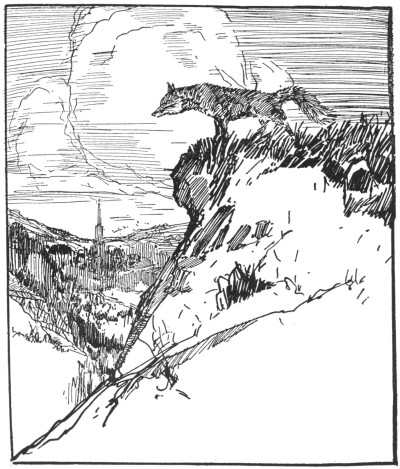 He saw the farms where the dogs were barking,
He saw the farms where the dogs were barking,
Cold Crendon Court and Copsecote Larking.
[Pg 175]
THE ROVING
[Pg 177]
Over the valley, floating faint
On a warmth of windflaw came the taint,
He cocked his ears, he upped his brush,
And he went up wind like an April thrush.
By the Roman Road to Braiches Ridge
Where the fallen willow makes a bridge,
Over the brook by White Hart's Thorn,
To the acres thin with pricking corn.
Over the sparse green hair of the wheat,
By the Clench Brook Mill at Clench Brook Leat,
Through Cowfoot Pastures to Nonely Stevens,
And away to Poltrewood St. Jevons.
Past Tott Hill Down all snaked with meuses,
Past Clench St. Michael and Naunton Crucis,
[Pg 178]
Past Howle's Oak Farm where the raving brain
Of a dog who heard him foamed his chain,
Then off, as the farmer's window opened,
Past Stonepits Farm to Upton Hope End;
Over short sweet grass and worn flint arrows,
And the three dumb hows of Tencombe Barrows;
And away and away with a rolling scramble,
Through the blackthorn and up the bramble,
[Pg 179]
With a nose for the smells the night wind carried,
And his red fell clean for being married.
For clicketting time and Ghost Heath Wood
Had put the violet in his blood.
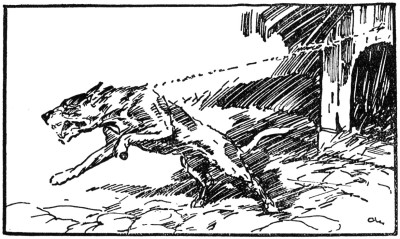
At Tencombe Rings near the Manor Linney,
His foot made the great black stallion whinny,
And the stallion's whinny aroused the stable
And the bloodhound bitches stretched their cable,
And the clink of the bloodhound's chain aroused
The sweet-breathed kye as they chewed and drowsed,
And the stir of the cattle changed the dream
Of the cat in the loft to tense green gleam.
The red-wattled black cock hot from Spain
Crowed from his perch for dawn again,
[Pg 180]
His breast-pufft hens, one-legged on perch,
Gurgled, beak-down, like men in church,
They crooned in the dark, lifting one red eye
In the raftered roost as the fox went by.
By Tencombe Regis and Slaughters Court,
Through the great grass square of Roman Fort,
By Nun's Wood Yews and the Hungry Hill,
And the Corpse Way Stones all standing still,
By Seven Springs Mead to Deerlip Brook,
And a lolloping leap to Water Hook.
Then with eyes like sparks and his blood awoken
Over the grass to Water's Oaken,
And over the hedge and into ride
In Ghost Heath Wood for his roving bride.
[Pg 181]
Before the dawn he had loved and fed
And found a kennel and gone to bed
On a shelf of grass in a thick of gorse
That would bleed a hound and blind a horse.
There he slept in the mild west weather
With his nose and brush well tucked together,
He slept like a child, who sleeps yet hears
With the self who needs neither eyes nor ears.
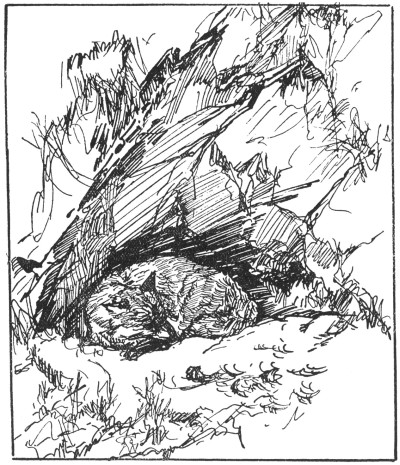 There he slept in the mild west weather
There he slept in the mild west weather
With his nose and brush well tucked together.
He slept while the pheasant cock untucked
His head from his wing, flew down and kukked,
While the drove of the starlings whirred and wheeled
Out of the ash-trees into field.
While with great black flags that flogged and paddled
[Pg 183]
The rooks went out to the plough and straddled,
Straddled wide on the moist red cheese
Of the furrows driven at Uppat's Leas.
Down in the village, men awoke,
The chimneys breathed with a faint blue smoke,
The fox slept on, though tweaks and twitches,
Due to his dreams, ran down his flitches.
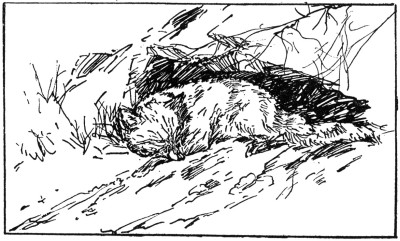
The cows were milked and the yards were sluict,
And the cocks and hens let out of roost,
Windows were opened, mats were beaten,
All men's breakfasts were cooked and eaten,
But out in the gorse on the grassy shelf,
The sleeping fox looked after himself.
[Pg 184]
Deep in his dream he heard the life
Of the woodland seek for food or wife,
The hop of a stoat, a buck that thumped,
The squeal of a rat as a weasel jumped,
The blackbird's chackering scattering crying,
The rustling bents from the rabbits flying,
Cows in a byre, and distant men,
And Condicote church-clock striking ten.
[Pg 186]
At eleven o'clock a boy went past,
With a rough-haired terrier following fast.
The boy's sweet whistle and dog's quick yap
Woke the fox from out of his nap.
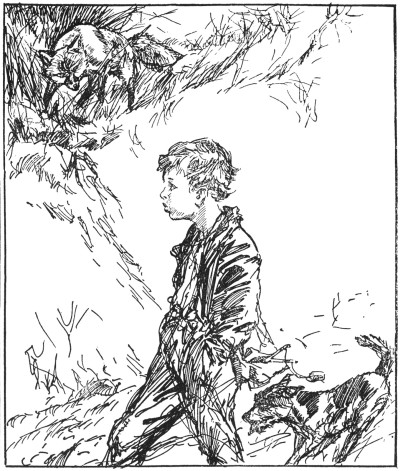 The boy's sweet whistle and dog's quick yap
The boy's sweet whistle and dog's quick yap
Woke the fox from out of his nap.
[Pg 187]
SCENT
[Pg 189]
He rose and stretched till the claws in his pads
Stuck hornily out like long black gads,
He listened a while, and his nose went round
To catch the smell of the distant sound.
The windward smells came free from taint
They were rabbit, strongly, with lime-kiln, faint,
A wild-duck, likely, at Sars Holt Pond,
And sheep on the Sars Holt Down beyond.
The lee-ward smells were much less certain
For the Ghost Heath Hill was like a curtain,
Yet vague, from the lee-ward, now and then,
Came muffled sounds like the sound of men.
[Pg 190]
He moved to his right to a clearer space,
And all his soul came into his face,
Into his eyes and into his nose,
As over the hill a murmur rose.
His ears were cocked and his keen nose flaired,
He sneered with his lips till his teeth were bared,
He trotted right and lifted a pad
Trying to test what foes he had.
[Pg 191]
SOUND
[Pg 193]
On Ghost Heath turf was a steady drumming
Which sounded like horses quickly coming,
It died as the hunt went down the dip,
Then Malapert yelped at Myngs's whip.
A bright iron horseshoe clinkt on stone,
Then a man's voice spoke, not one alone,
Then a burst of laughter, swiftly still,
Muffled away by Ghost Heath Hill.
Then, indistinctly, the clop, clip, clep,
On Brady Ride, of a horse's step.
Then silence, then, in a burst, much clearer,
Voices and horses coming nearer,
And another noise, of a pit-pat beat
On the Ghost Hill grass, of foxhound feet.
[Pg 194]
He sat on his haunches listening hard,
While his mind went over the compass card,
Men were coming and rest was done,
But he still had time to get fit to run;
He could outlast horse and outrace hound,
But men were devils from Lobs's Pound.
Scent was burning, the going good
The world one lust for a fox's blood,
The main earths stopped and the drains put-to,
And fifteen miles to the land he knew.
But of all the ills, the ill least pleasant
Was to run in the light when men were present.
Men in the fields to shout and sign
For a lift of hounds to a fox's line.
Men at the earth at the long point's end,
Men at each check and none his friend,
[Pg 195]
Guessing each shift that a fox contrives,
But still, needs must when the devil drives.
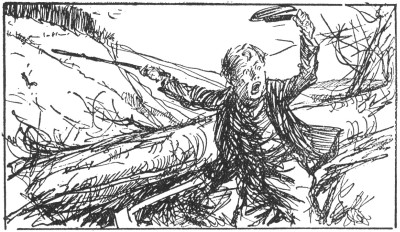
He readied himself, then a soft horn blew,
Then a clear voice carolled "Ed-hoick. Eleu."
Then the wood-end rang with the clear voice crying
And the crackle of scrub where hounds were trying.
[Pg 196]
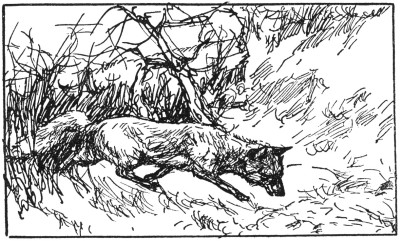
Then, the horn blew nearer, a hound's voice quivered,
Then another, then more, till his body shivered,
He left his kennel and trotted thence
With his ears flexed back and his nerves all tense.
He trotted down with his nose intent
For a fox's line to cross his scent,
It was only fair (he being a stranger)
[Pg 197]
That the native fox should have the danger.
Danger was coming, so swift, so swift,
That the pace of his trot began to lift
The blue-winged Judas, a jay, began
Swearing, hounds whimpered, air stank of man.
He hurried his trotting, he now felt frighted,
It was his poor body made hounds excited,
He felt as he ringed the great wood through
That he ought to make for the land he knew.
Then the hounds' excitement quivered and quickened,
Then a horn blew death till his marrow sickened
Then the wood behind was a crash of cry
For the blood in his veins; it made him fly.
[Pg 198]
They were on his line; it was death to stay,
He must make for home by the shortest way,
But with all this yelling and all this wrath
And all these devils, how find a path?
He ran like a stag to the wood's north corner,
Where the hedge was thick and the ditch a yawner,
But the scarlet glimpse of Myngs on Turk,
Watching the woodside, made him shirk.
He ringed the wood and looked at the south.
What wind there was blew into his mouth.
But close to the woodland's blackthorn thicket
Was Dansey, still as a stone, on picket.
At Dansey's back were a twenty more
Watching the cover and pressing fore.
[Pg 199]
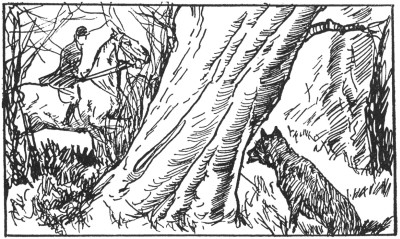
The fox drew in and flaired with his muzzle.
Death was there if he messed the puzzle.
There were men without and hounds within,
A crying that stiffened the hair on skin,
Teeth in cover and death without,
Both deaths coming, and no way out.
[Pg 201]
FOUND
[Pg 203]
His nose ranged swiftly, his heart beat fast,
Then a crashing cry rose up in a blast,
Then horse hooves trampled, then horses' flitches
Burst their way through the hazel switches,
Then the horn again made the hounds like mad,
And a man, quite near, said "Found, by Gad,"
And a man, quite near, said "Now he'll break.
Lark's Leybourne Copse is the line he'll take."
And the men moved up with their talk and stink
And the traplike noise of the horseshoe clink.
Men whose coming meant death from teeth
In a worrying wrench with him beneath.
[Pg 204]
The fox sneaked down by the cover side,
(With his ears flexed back) as a snake would glide,
He took the ditch at the cover-end,
He hugged the ditch as his only friend.
The blackbird cock with the golden beak
Got out of his way with a jabbering shriek,
And the shriek told Tom on the raking bay
That for eighteen pence he was gone away.
[Pg 205]
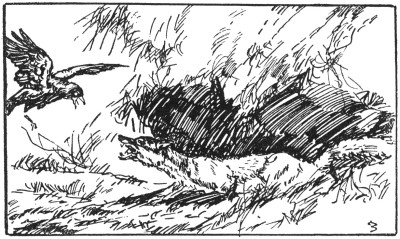
He ran in the hedge in the triple growth
Of bramble and hawthorn, glad of both,
Till a couple of fields were past, and then
Came the living death of the dread of men.
Then, as he listened, he heard a "Hoy,"
Tom Dansey's horn and "Awa-wa-woy."
Then all hounds crying with all their forces,
Then a thundering down of seventy horses.
Robin Dawe's horn and halloos of "Hey
Hark Hollar, Hoik" and "Gone away,"
"Hark Hollar Hoik," and the smack of a whip,
A yelp as a tail hound caught the clip.
"Hark Hollar, Hark Hollar"; then Robin made
Pip go crash through the cut-and-laid,
Hounds were over and on his line
[Pg 206]
With a head like bees upon Tipple Tine.
The sound of the nearness sent a flood
Of terror of death through the fox's blood.
He upped his brush and he cocked his nose,
And he went up wind as a racer goes.
[Pg 207]
AWAY
[Pg 209]
Bold Robin Dawe was over first,
Cheering his hounds on at the burst;
The field were spurring to be in it,
"Hold hard, sirs, give them half a minute,"
Came from Sir Peter on his white.
The hounds went romping with delight
[Pg 210]
Over the grass and got together;
The tail hounds galloped hell-for-leather
After the pack at Myngs's yell;
A cry like every kind of bell
Rang from these rompers as they raced.
The riders thrusting to be placed,
Jammed down their hats and shook their horses,
The hounds romped past with all their forces,
They crashed into the blackthorn fence;
The scent was heavy on their sense,
So hot it seemed the living thing,
It made the blood within them sing,
Gusts of it made their hackles rise,
Hot gulps of it were agonies
Of joy, and thirst for blood, and passion.
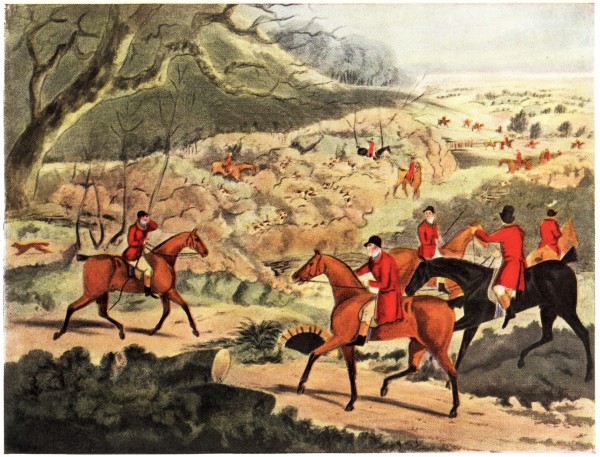 Courtesy Arthur Ackermann and Son, New York
Courtesy Arthur Ackermann and Son, New York
[Pg 211]
"Forrard," cried Robin, "that's the fashion."
He raced beside his pack to cheer.
The field's noise died upon his ear,
A faint horn, far behind, blew thin
In cover, lest some hound were in.
Then instantly the great grass rise
Shut field and cover from his eyes,
He and his racers were alone.
"A dead fox or a broken bone,"
Said Robin, peering for his prey.
The rise, which shut his field away,
Shewed him the vale's great map spread out,
The downs' lean flank and thrusting snout,
Pale pastures, red-brown plough, dark wood,
Blue distance, still as solitude,
Glitter of water here and there,
[Pg 212]
The trees so delicately bare.
The dark green gorse and bright green holly.
"O glorious God," he said, "how jolly."
And there, down hill, two fields ahead,
The lolloping red dog-fox sped
Over Poor Pastures to the brook.
He grasped these things in one swift look
Then dived into the bulfinch heart
Through thorns that ripped his sleeves apart
And skutched new blood upon his brow.
"His point's Lark's Leybourne Covers now,"
Said Robin, landing with a grunt,
"Forrard, my beautifuls."
The hunt
Followed down hill to race with him,
White Rabbit with his swallow's skim,
[Pg 213]
Drew within hail, "Quick burst, Sir Peter."
"A traveller. Nothing could be neater.
Making for Godsdown clumps, I take it?"
"Lark's Leybourne, sir, if he can make it.
Forrard."
[Pg 215]
THE FIELD
[Pg 217]
Bill Ridden thundered down;
His big mouth grinned beneath his frown,
The hounds were going away from horses.
He saw the glint of water-courses,
Yell Brook and Wittold's Dyke ahead,
His horse shoes sliced the green turf red.
Young Cothill's chaser rushed and passt him,
Nob Manor, running next, said "Blast him,
That poet chap who thinks he rides."
Hugh Colway's mare made straking strides
Across the grass, the Colonel next:
Then Squire volleying oaths and vext,
Fighting his hunter for refusing:
Bell Ridden like a cutter cruising
[Pg 218]
Sailing the grass, then Cob on Warder,
Then Minton Price upon Marauder;
Ock Gurney with his eyes intense,
Burning as with a different sense,
His big mouth muttering glad "by damns";
Then Pete crouched down from head to hams,
Rapt like a saint, bright focussed flame.
Bennett with devils in his wame
Chewing black cud and spitting slanting;
Copse scattering jests and Stukely ranting;
Sal Ridden taking line from Dansey;
Long Robert forcing Necromancy;
A dozen more with bad beginnings;
Myngs riding hard to snatch an innings,
A wild last hound with high shrill yelps,
Smacked forrard with some whip-thong skelps.
[Pg 219]
Then last of all, at top of rise,
The crowd on foot all gasps and eyes
The run up hill had winded them.
They saw the Yell Brook like a gem
Blue in the grass a short mile on,
They heard faint cries, but hounds were gone
A good eight fields and out of sight
Except a rippled glimmer white
Going away with dying cheering
And scarlet flappings disappearing,
And scattering horses going, going,
Going like mad, White Rabbit snowing
Far on ahead, a loose horse taking,
Fence after fence with stirrups shaking,
And scarlet specks and dark specks dwindling.
[Pg 220]
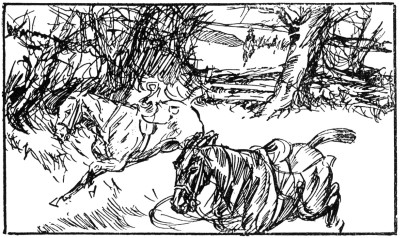
Nearer, were twigs knocked into kindling,
A much bashed fence still dropping stick,
Flung clods, still quivering from the kick,
Cut hoof-marks pale in cheesy clay,
The horse-smell blowing clean away.
Birds flitting back into the cover.
One last faint cry, then all was over.
The hunt had been, and found, and gone.
[Pg 221]
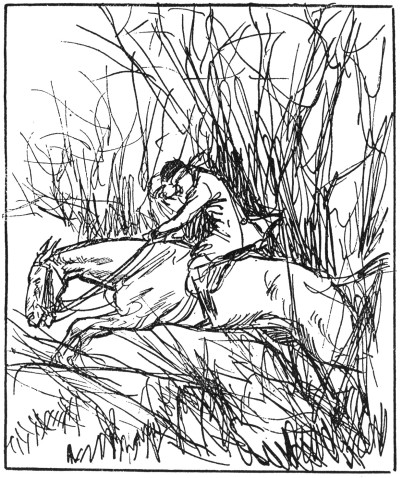 He faced the fence and put her through it
He faced the fence and put her through it
Shielding his eyes lest spikes should blind him.
At Neakings Farm, three furlongs on,
Hounds raced across the Waysmore Road,
Where many of the riders slowed
To tittup down a grassy lane,
Which led as hounds led in the main
And gave no danger of a fall.
There, as they tittupped one and all,
Big Twenty Stone came scattering by,
His great mare made the hoof-casts fly.
"By leave," he cried. "Come on. Come up,
This fox is running like a tup;
Let's leave this lane and get to terms.
No sense in crawling here like worms.
Come, let me past and let me start,
This fox is running like a hart,
And this is going to be a run.
[Pg 223]
Thanky. By leave. Now, Maiden; do it."
He faced the fence and put her through it
Shielding his eyes lest spikes should blind him,
The crashing blackthorn closed behind him.
Mud-scatters chased him as he scudded.
His mare's ears cocked, her neat feet thudded.
[Pg 225]
THE RUN
[Pg 227]
The kestrel cruising over meadow
Watched the hunt gallop on his shadow,
Wee figures, almost at a stand,
Crossing the multi-coloured land,
Slow as a shadow on a dial.
Some horses, swerving at a trial,
Baulked at a fence: at gates they bunched.
The mud about the gates was dunched.
Like German cheese; men pushed for places,
And kicked the mud into the faces
Of those who made them room to pass.
The half-mile's gallop on the grass,
Had tailed them out, and warmed their blood.
[Pg 228]
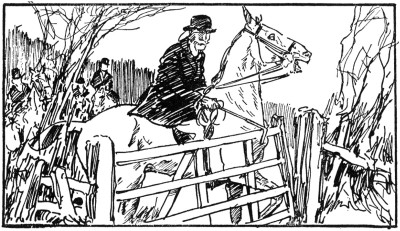
"His point's the Banner Barton Wood."
"That, or Goat's Gorse." "A stinger, this."
"You're right in that; by Jove it is."
"An up-wind travelling fox, by George."
"They say Tom viewed him at the forge."
"Well, let me pass and let's be on."
They crossed the lane to Tolderton,
The hill-marl died to valley clay,
[Pg 229]
And there before them ran the grey
Yell Water, swirling as it ran,
The Yell Brook of the hunting man.
The hunters eyed it and were grim.
They saw the water snaking slim
Ahead, like silver; they could see
(Each man) his pollard willow tree
Firming the bank, they felt their horses
[Pg 230]
Catch the gleam's hint and gather forces;
They heard the men behind draw near.
Each horse was trembling as a spear
Trembles in hand when tense to hurl,
They saw the brimmed brook's eddies curl.
The willow-roots like water-snakes;
The beaten holes the ratten makes,
They heard the water's rush; they heard
Hugh Colway's mare come like a bird;
A faint cry from the hounds ahead,
Then saddle-strain, the bright hooves' tread,
Quick words, the splash of mud, the launch,
The sick hope that the bank be staunch,
Then Souse, with Souse to left and right.
Maroon across, Sir Peter's white
Down but pulled up, Tom over, Hugh
[Pg 231]
Mud to the hat but over, too,
Well splashed by Squire who was in.
With draggled pink stuck close to skin,
The Squire leaned from bank and hauled
His mired horse's rein; he bawled
For help from each man racing by.
"What, help you pull him out? Not I.
What made you pull him in?" they said.
Nob Manor cleared and turned his head,
And cried "Wade up. The ford's upstream."
Ock Gurney in a cloud of steam
Stood by his dripping cob and wrung
The taste of brook mud from his tongue
And scraped his poor cob's pasterns clean.
"Lord, what a crowner we've a been,
[Pg 232]
This jumping brook's a mucky job."
He muttered, grinning, "Lord, poor cob.
Now sir, let me." He turned to Squire
And cleared his hunter from the mire
By skill and sense and strength of arm.
[Pg 233]
FULL CRY
[Pg 235]
Meanwhile the fox passed Nonesuch Farm,
Keeping the spinney on his right.
Hounds raced him here with all their might
Along the short firm grass, like fire.
The cowman viewed him from the byre
Lolloping on, six fields ahead,
Then hounds, still carrying such a head,
It made him stare, then Rob on Pip,
Sailing the great grass like a ship,
Then grand Maroon in all his glory
Sweeping his strides, his great chest hoary
With foam fleck and the pale hill-marl.
They strode the Leet, they flew the Snarl,
They knocked the nuts at Nonesuch Mill,
[Pg 236]
Raced up the spur of Gallows Hill
And viewed him there. The line he took
Was Tineton and the Pantry Brook,
Going like fun and hounds like mad.
Tom glanced to see what friends he had
Still within sight, before he turned
The ridge's shoulder; he discerned,
One field away, young Cothill sailing
Easily up. Pete Gurney failing,
Hugh Colway quartering on Sir Peter,
Bill waiting on the mare to beat her,
Sal Ridden skirting to the right.
A horse, with stirrups flashing bright
Over his head at every stride,
Looked like the Major's; Tom espied
Far back, a scarlet speck of man
[Pg 237]
Running, and straddling as he ran.
Charles Copse was up, Nob Manor followed,
Then Bennett's big-boned black that wallowed
Clumsy, but with the strength of ten.
Then black and brown and scarlet men,
Brown horses, white and black and grey
Scattered a dozen fields away.
The shoulder shut the scene away.
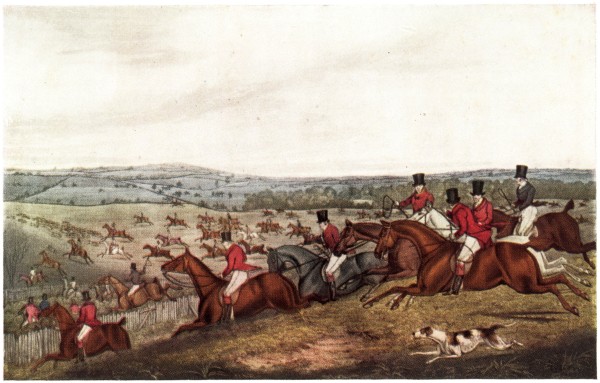 Courtesy Arthur Ackermann and Son, New York
Courtesy Arthur Ackermann and Son, New York
From the Gallows Hill to the Tineton Copse
There were ten ploughed fields like ten full stops,
All wet red clay where a horse's foot
Would be swathed, feet thick, like an ash-tree root.
The fox raced on, on the headlands firm,
Where his swift feet scared the coupling worm,
[Pg 238]
The rooks rose raving to curse him raw
He snarled a sneer at their swoop and caw.
Then on, then on, down a half ploughed field
Where a ship-like plough drave glitter-keeled,
With a bay horse near and a white horse leading,
And a man saying "Zook" and the red earth bleeding.
He gasped as he saw the ploughman drop
The stilts and swear at the team to stop.
The ploughman ran in his red clay clogs
Crying "Zick un, Towzer; zick, good dogs."
A couple of wire-haired lurchers lean
Arose from his wallet, nosing keen;
With a rushing swoop they were on his track,
Putting chest to stubble to bite his back.
He swerved from his line with the curs at heel,
[Pg 239]
The teeth as they missed him clicked like steel,
With a worrying snarl, they quartered on him,
While the ploughman shouted "Zick; upon him."
The lurcher dogs soon shot their bolt,
And the fox raced on by the Hazel Holt,
Down the dead grass tilt to the sandstone gash
Of the Pantry Brook at Tineton Ash.
The loitering water, flooded full,
[Pg 240]
Had yeast on its lip like raddled wool,
It was wrinkled over with Arab script
Of eddies that twisted up and slipt.
The stepping stones had a rush about them
So the fox plunged in and swam without them.
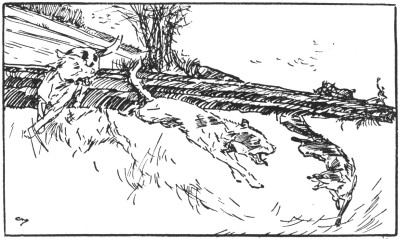
He crossed to the cattle's drinking shallow
Firmed up with rush and the roots of mallow,
He wrung his coat from his draggled bones
And romped away for the Sarsen Stones.
A sneaking glance with his ears flexed back,
Made sure that his scent had failed the pack,
For the red clay, good for corn and roses,
Was cold for scent and brought hounds to noses.
He slackened pace by the Tineton Tree,
[Pg 241]
(A vast hollow ash-tree grown in three),
He wriggled a shake and padded slow,
Not sure if the hounds were on or no.
A horn blew faint, then he heard the sounds
Of a cantering huntsman, lifting hounds,
The ploughman had raised his hat for sign,
And the hounds were lifted and on his line.
He heard the splash in the Pantry Brook,
And a man's voice: "Thiccy's the line he took,"
And a clear "Yoi doit" and a whimpering quaver,
Though the lurcher dogs had dulled the savour.
The fox went off while the hounds made halt,
And the horses breathed and the field found fault,
But the whimpering rose to a crying crash
[Pg 242]
By the hollow ruin of Tineton Ash.
Then again the kettle drum horse hooves beat,
And the green blades bent to the fox's feet
And the cry rose keen not far behind
Of the "Blood, blood, blood" in the fox-hounds' mind.
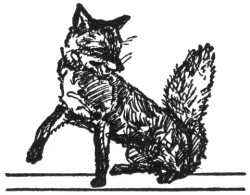
The fox was strong, he was full of running,
He could run for an hour and then be cunning,
But the cry behind him made him chill,
They were nearer now and they meant to kill.
They meant to run him until his blood
Clogged on his heart as his brush with mud,
[Pg 243]
Till his back bent up and his tongue hung flagging,
And his belly and brush were filthed from dragging.
Till he crouched stone still, dead-beat and dirty,
With nothing but teeth against the thirty.
And all the way to that blinding end
He would meet with men and have none his friend.
Men to holloa and men to run him,
With stones to stagger and yells to stun him,
Men to head him, with whips to beat him,
Teeth to mangle and mouths to eat him.
And all the way, that wild high crying,
To cold his blood with the thought of dying,
The horn and the cheer, and the drum-like thunder,
Of the horse hooves stamping the meadows under.
[Pg 244]
He upped his brush and went with a will
For the Sarsen Stones on Wan Dyke Hill.
As he ran the meadow by Tineton Church,
A christening party left the porch,
They stood stock still as he pounded by,
They wished him luck but they thought he'd die.
The toothless babe in his long white coat
Looked delicate meat, the fox took note;
But the sight of them grinning there, pointing finger,
Made him put on steam till he went a stinger.
Past Tineton Church over Tineton Waste,
With the lolloping ease of a fox's haste,
The fur on his chest blown dry with the air,
[Pg 245]
His brush still up and his cheek-teeth bare.
Over the Waste where the ganders grazed,
The long swift lilt of his loping lazed,
His ears cocked up as his blood ran higher,
He saw his point, and his eyes took fire.
The Wan Dyke Hill with its fir tree barren,
Its dark of gorse and its rabbit warren.
The Dyke on its heave like a tightened girth,
And holes in the Dyke where a fox might earth.
He had rabbitted there long months before,
The earths were deep and his need was sore,
The way was new, but he took a vearing,
And rushed like a blown ship billow-sharing.
Off Tineton Common to Tineton Dean,
Where the wind-hid elders pushed with green;
[Pg 246]
Through the Dean's thin cover across the lane,
And up Midwinter to King of Spain.
Old Joe at digging his garden grounds,
Said "A fox, being hunter; where be hounds?
O lord, my back, to be young again,
'Stead a zellin zider in King of Spain.
O hark, I hear 'em, O sweet, O sweet.
Why there be redcoat in Gearge's wheat.
And there be redcoat, and there they gallop.
Thur go a browncoat down a wallop.
Quick, Ellen, quick, come Susan, fly.
Here'm hounds. I zeed the fox go by,
Go by like thunder, go by like blasting,
With his girt white teeth all looking ghasting.
Look there come hounds. Hark, hear 'em crying.
Lord, belly to stubble, ain't they flying.
[Pg 247]
There's huntsmen, there. The fox come past
(As I was digging) as fast as fast.
He's only been gone a minute by;
A girt dark dog as pert as pye."
Ellen and Susan came out scattering
Brooms and dustpans till all was clattering;
They saw the pack come head to foot
Running like racers nearly mute;
Robin and Dansey quartering near,
All going gallop like startled deer.
A half dozen flitting scarlets shewing
In the thin green Dean where the pines were growing.
Black coats and brown coats thrusting and spurring
[Pg 248]
Sending the partridge coveys whirring,
Then a rattle up hill and a clop up lane,
It emptied the bar of the King of Spain.
Tom left his cider, Dick left his bitter,
Ganfer James left his pipe and spitter,
Out they came from the sawdust floor,
They said, "They'm going." They said "O Lor."
The fox raced on, up the Barton Balks,
With a crackle of kex in the nettle stalks,
Over Hammond's grass to the dark green line
Of the larch-wood smelling of turpentine.
Scratch Steven Larches, black to the sky,
A sadness breathing with one long sigh,
Grey ghosts of treen under funeral plumes,
[Pg 249]
A mist of twig over soft brown glooms.
As he entered the wood he heard the smacks,
Chip-jar, of the fir pole feller's axe,
He swerved to the left to a broad green ride,
Where a boy made him rush for the further side.
He swerved to the left, to the Barton Road,
But there were the timberers come to load.
Two timber carts and a couple of carters
With straps round their knees instead of garters.
He swerved to the right, straight down the wood,
The carters watched him, the boy hallooed.
He leaped from the larch wood into tillage,
The cobbler's garden of Barton village.
The cobbler bent at his wooden foot,
Beating sprigs in a broken boot;
[Pg 250]
He wore old glasses with thick horn rim,
He scowled at his work for his sight was dim.
His face was dingy, his lips were grey,
From primming sparrowbills day by day;
As he turned his boot he heard a noise
At his garden-end and he thought, "It's boys."
He saw his cat nip up on the shed,
Where her back arched up till it touched her head,
He saw his rabbit race round and round
Its little black box three feet from ground.
His six hens cluckered and flucked to perch,
"That's boys," said cobbler, "so I'll go search."
He reached his stick and blinked in his wrath,
When he saw a fox in his garden path.
The fox swerved left and scrambled out
[Pg 251]
Knocking crinked green shells from the Brussels Sprout,
He scrambled out through the cobbler's paling,
And up Pill's orchard to Purton's Tailing,
Across the plough at the top of bent,
Through the heaped manure to kill his scent,
Over to Aldams, up to Cappells,
Past Nursery Lot with its white-washed apples,
Past Colston's Broom, past Gaunts, past Sheres,
Past Foxwhelps Oasts with their hooded ears,
Past Monk's Ash Clerewell, past Beggars Oak,
Past the great elms blue with the Hinton smoke,
Along Long Hinton to Hinton Green,
Where the wind-washed steeple stood serene
With its golden bird still sailing air,
Past Banner Barton, past Chipping Bare,
[Pg 252]
Past Maddings Hollow, down Dundry Dip,
And up Goose Grass to the Sailing Ship.
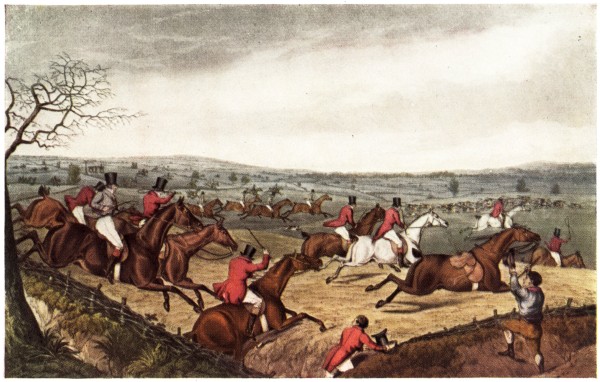 Courtesy Arthur Ackermann and Son, New York
Courtesy Arthur Ackermann and Son, New York
The three black firs of the Ship stood still
On the bare chalk heave of the Dundry Hill,
The fox looked back as he slackened past
The scaled red-hole of the mizzen-mast.
[Pg 253]
VIEW HALLOO
[Pg 255]
There they were coming, mute but swift,
A scarlet smear in the blackthorn rift,
A white horse rising, a dark horse flying,
And the hungry hounds too tense for crying.
Stormcock leading, his stern spear-straight,
Racing as though for a piece of plate,
Little speck horsemen field on field;
Then Dansey viewed him and Robin squealed
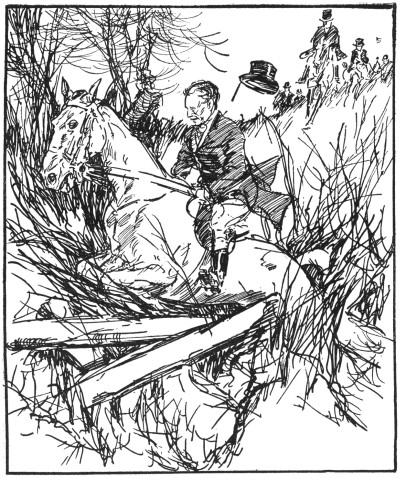 A white horse rising, a dark horse flying.
A white horse rising, a dark horse flying.
At the View Halloo the hounds went frantic,
Back went Stormcock and up went Antic,
Up went Skylark as Antic sped
It was zest to blood how they carried head.
[Pg 257]
Skylark dropped as Maroon drew by,
Their hackles lifted, they scored to cry.
The fox knew well, that before they tore him,
They should try their speed on the downs before him,
There were three more miles to the Wan Dyke Hill,
But his heart was high, that he beat them still.
The wind of the downland charmed his bones
So off he went for the Sarsen Stones.
The moan of the three great firs in the wind,
And the Ai of the foxhounds died behind,
Wind-dapples followed the hill-wind's breath
On the Kill Down gorge where the Danes found death;
[Pg 258]
Larks scattered up; the peewits feeding
Rose in a flock from the Kill Down Steeding.
The hare leaped up from her form and swerved
Swift left for the Starveall harebell-turved.
On the wind-bare thorn some longtails prinking
Cried sweet, as though wind blown glass were chinking.
Behind came thudding and loud halloo
Or a cry from hounds as they came to view.
The pure clean air came sweet to his lungs,
Till he thought foul scorn of those crying tongues,
In a three mile more he would reach the haven
In the Wan Dyke croaked on by the raven,
In a three mile more he would make his berth
On the hard cool floor of a Wan Dyke earth,
[Pg 259]
Too deep for spade, too curved for terrier,
With the pride of the race to make rest the merrier.
In a three mile more he would reach his dream,
So his game heart gulped and he put on steam.
Like a rocket shot to a ship ashore,
The lean red bolt of his body tore,
Like a ripple of wind running swift on grass,
Like a shadow on wheat when a cloud blows past,
Like a turn at the buoy in a cutter sailing,
When the bright green gleam lips white at the railing,
Like the April snake whipping back to sheath,
Like the gannet's hurtle on fish beneath,
Like a kestrel chasing, like a sickle reaping,
Like all things swooping, like all things sweeping,
[Pg 260]
Like a hound for stay, like a stag for swift,
With his shadow beside like spinning drift.
Past the gibbet-stock all stuck with nails,
Where they hanged in chains what had hung at jails,
Past Ashmundshowe where Ashmund sleeps,
And none but the tumbling peewit weeps,
Past Curlew Calling, the gaunt grey corner
Where the curlew comes as a summer mourner,
Past Blowbury Beacon shaking his fleece,
[Pg 261]
Where all winds hurry and none brings peace,
Then down, on the mile-long green decline
Where the turf's like spring and the air's like wine,
Where the sweeping spurs of the downland spill
Into Wan Brook Valley and Wan Dyke Hill.
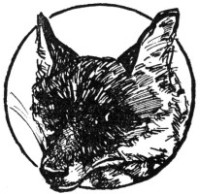
On he went with a galloping rally
Past Maesbury Clump for Wan Brook Valley,
The blood in his veins went romping high,
"Get on, on, on to the earth or die."
The air of the downs went purely past,
Till he felt the glory of going fast,
Till the terror of death, though there indeed,
Was lulled for a while by his pride of speed;
He was romping away from hounds and hunt,
He had Wan Dyke Hill and his earth in front,
[Pg 262]
In a one mile more when his point was made,
He would rest in safety from dog or spade;
Nose between paws he would hear the shout
Of the "gone to earth" to the hounds without,
The whine of the hounds, and their cat feet gadding.
Scratching the earth, and their breath pad-padding,
He would hear the horn call hounds away,
And rest in peace till another day.
In one mile more he would lie at rest
So for one mile more he would go his best.
He reached the dip at the long droop's end
And he took what speed he had still to spend.
So down past Maesbury beech clump grey,
That would not be green till the end of May,
[Pg 263]
Past Arthur's Table, the white chalk boulder,
Where pasque flowers purple the down's grey shoulder,
Past Quichelm's Keeping, past Harry's Thorn
To Thirty Acre all thin with corn.
As he raced the corn towards Wan Dyke Brook,
The pack had view of the way he took,
Robin hallooed from the downland's crest,
He capped them on till they did their best.
The quarter mile to the Wan Brook's brink
Was raced as quick as a man can think.
And here, as he ran to the huntsman's yelling,
The fox first felt that the pace was telling,
His body and lungs seemed all grown old,
His legs less certain, his heart less bold,
The hound-noise nearer, the hill slope steeper,
[Pg 264]
The thud in the blood of his body deeper,
His pride in his speed, his joy in the race
Were withered away, for what use was pace?
He had run his best, and the hounds ran better.
Then the going worsened, the earth was wetter.
Then his brush drooped down till it sometimes dragged,
And his fur felt sick and his chest was tagged
[Pg 265]
With taggles of mud, and his pads seemed lead,
It was well for him he'd an earth ahead.
Down he went to the brook and over,
Out of the corn and into the clover,
Over the slope that the Wan Brook drains,
Past Battle Tump where they earthed the Danes,
Then up the hill that the Wan Dyke rings
Where the Sarsen Stones stand grand like kings.
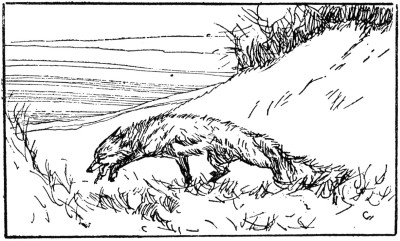
Seven Sarsens of granite grim,
As he ran them by they looked at him;
As he leaped the lip of their earthen paling
The hounds were gaining and he was failing.
He passed the Sarsens, he left the spur,
He pressed up hill to the blasted fir,
[Pg 266]
He slipped as he leaped the hedge; he slithered;
"He's mine," thought Robin. "He's done; he's dithered."
At the second attempt he cleared the fence,
He turned half right where the gorse was dense,
He was leading hounds by a furlong clear.
He was past his best, but his earth was near.
He ran up gorse, to the spring of the ramp,
The steep green wall of the dead men's camp,
He sidled up it and scampered down
To the deep green ditch of the dead men's town.
Within, as he reached that soft green turf,
The wind, blowing lonely, moaned like surf,
Desolate ramparts rose up steep,
On either side, for the ghosts to keep.
[Pg 267]
He raced the trench, past the rabbit warren,
Close grown with moss which the wind made barren,
He passed the spring where the rushes spread,
And there in the stones was his earth ahead.
One last short burst upon failing feet,
There life lay waiting, so sweet, so sweet,
Rest in a darkness, balm for aches.
The earth was stopped. It was barred with stakes.
[Pg 269]
LAST HOPE
[Pg 271]
With hounds at head so close behind
He had to run as he changed his mind.
This earth, as he saw, was stopped, but still
There was one earth more on the Wan Dyke Hill.
A rabbit burrow a furlong on,
He could kennel there till the hounds were gone.
Though his death seemed near he did not blench
He upped his brush and he ran the trench.
He ran the trench while the wind moaned treble,
Earth trickled down, there were falls of pebble.
Down in the valley of that dark gash
The wind-withered grasses looked like ash.
Trickles of stones and earth fell down
[Pg 272]
In that dark valley of dead men's town.
A hawk arose from a fluff of feathers,
From a distant fold came a bleat of wethers.
He heard no noise from the hounds behind
But the hill-wind moaning like something blind.
He turned the bend in the hill and there
Was his rabbit-hole with its mouth worn bare,
But there with a gun tucked under his arm
Was young Sid Kissop of Purlpits Farm,
With a white hob ferret to drive the rabbit
Into a net which was set to nab it.
And young Jack Cole peered over the wall
And loosed a pup with a "Z'bite en, Saul,"
The terrier pup attacked with a will,
So the fox swerved right and away down hill.
[Pg 273]
Down from the ramp of the Dyke he ran
To the brackeny patch where the gorse began,
Into the gorse, where the hill's heave hid
The line he took from the eyes of Sid
He swerved down wind and ran like a hare
For the wind-blown spinney below him there.
He slipped from the Gorse to the spinney dark
(There were curled grey growths on the oak tree bark)
He saw no more of the terrier pup.
But he heard men speak and the hounds come up.
He crossed the spinney with ears intent
For the cry of hounds on the way he went,
His heart was thumping, the hounds were near now,
[Pg 274]
He could make no sprint at a cry and cheer now,
He was past his perfect, his strength was failing,
His brush sag-sagged and his legs were ailing.
He felt as he skirted Dead Men's Town,
That in one mile more they would have him down.
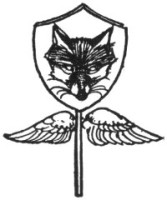
[Pg 275]
CHECKED
[Pg 277]
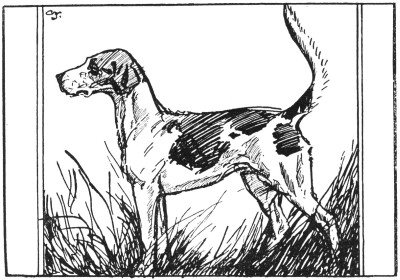
Through the withered oak's wind-crouching tops
He saw men's scarlet above the copse,
He heard men's oaths, yet he felt hounds slacken
In the frondless stalks of the brittle bracken.
[Pg 278]
He felt that the unseen link which bound
His spine to the nose of the leading hound,
Was snapped, that the hounds no longer knew
Which way to follow nor what to do;
That the threat of the hound's teeth left his neck,
They had ceased to run, they had come to check,
They were quartering wide on the Wan Hill's bent.
The terrier's chase had killed his scent.
He heard bits chink as the horses shifted,
He heard hounds cast, then he heard hounds lifted,
But there came no cry from a new attack,
His heart grew steady, his breath came back.
He left the spinney and ran its edge,
By the deep dry ditch of the blackthorn hedge,
[Pg 279]
Then out of the ditch and down the meadow,
Trotting at ease in the blackthorn shadow
Over the track called Godsdown Road,
To the great grass heave of the gods' abode,
He was moving now upon land he knew
Up Clench Royal and Morton Tew,
The Pol Brook, Cheddesdon and East Stoke Church,
High Clench St. Lawrence and Tinker's Birch,
Land he had roved on night by night,
For hot blood suckage or furry bite,
The threat of the hounds behind was gone;
He breathed deep pleasure and trotted on.
While young Sid Kissop thrashed the pup,
Robin on Pip came heaving up,
And found his pack spread out at check.
"I'd like to wring your terrier's neck,"
[Pg 280]
He said, "You see? He's spoiled our sport.
He's killed the scent." He broke off short,
And stared at hounds and at the valley.
No jay or magpie gave a rally
Down in the copse, no circling rooks
Rose over fields; old Joyful's looks
Were doubtful in the gorse, the pack
Quested both up and down and back.
He watched each hound for each small sign.
They tried, but could not hit the line,
The scent was gone. The field took place
Out of the way of hounds. The pace
Had tailed them out; though four remained:
Sir Peter, on White Rabbit stained
Red from the brooks, Bill Ridden cheery,
[Pg 281]
Hugh Colway with his mare dead weary.
The Colonel with Marauder beat.
They turned towards a thud of feet;
Dansey, and then young Cothill came
(His chestnut mare was galloped tame).
"There's Copse, a field behind," he said.
"Those last miles put them all to bed.
They're strung along the downs like flies."
Copse and Nob Manor topped the rise.
"Thank God, a check," they said, "at last."
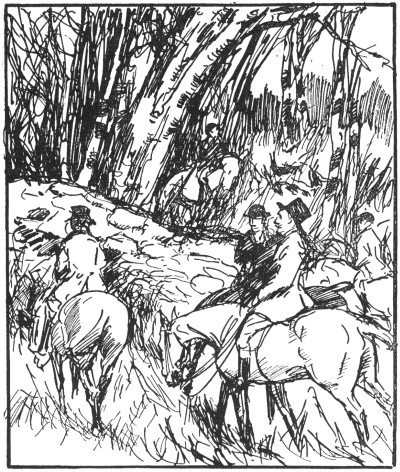 "Thank God, a check," they said, "at last."
"Thank God, a check," they said, "at last."
"They cannot own it; you must cast."
"They cannot own it; you must cast,"
Sir Peter said. The soft horn blew,
Tom turned the hounds up wind; they drew
Up wind, down hill, by spinney side.
They tried the brambled ditch; they tried
[Pg 283]
The swamp, all choked with bright green grass
And clumps of rush and pools like glass,
Long since, the dead men's drinking pond.
They tried the White Leaved Oak beyond,
But no hound spoke to it or feathered.
The horse heads drooped like horses tethered,
The men mopped brows. "An hour's hard run.
Ten miles," they said, "we must have done.
It's all of six from Colston's Gorses."
The lucky got their second horses.
The time ticked by. "He's lost," they muttered.
A pheasant rose. A rabbit scuttered.
Men mopped their scarlet cheeks and drank.
[Pg 284]
They drew down wind along the bank,
(The Wan Way) on the hill's south spur,
Grown with dwarf oak and juniper
Like dwarves alive, but no hound spoke.
The seepings made the ground one soak.
They turned the spur; the hounds were beat.
Then Robin shifted in his seat
Watching for signs, but no signs shewed.
"I'll lift across the Godsdown Road,
Beyond the spinney," Robin said.
Tom turned them; Robin went ahead.
Beyond the copse a great grass fallow
Stretched towards Stoke and Cheddesdon Mallow,
A rolling grass where hounds grew keen.
"Yoi doit, then; this is where he's been,"
[Pg 285]
Said Robin, eager at their joy.
"Yooi, Joyful, lad, yooi, Cornerboy.
They're on to him."
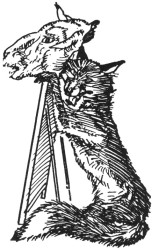
[Pg 287]
"ON"
[Pg 289]
At his reminders
The keen hounds hurried to the finders.
The finding hounds began to hurry,
Men jammed their hats prepared to skurry,
The Ai Ai of the cry began.
Its spirit passed to horse and man,
The skirting hounds romped to the cry.
Hound after hound cried Ai Ai Ai,
Till all were crying, running, closing,
Their heads well up and no heads nosing,
Joyful ahead with spear-straight stern.
They raced the great slope to the burn.
Robin beside them, Tom behind,
Pointing past Robin down the wind.
[Pg 290]
For there, two furlongs on, he viewed
On Holy Hill or Cheddesdon Rood
Just where the ploughland joined the grass,
A speck down the first furrow pass,
A speck the colour of the plough.
"Yonder he goes. We'll have him now,"
He cried. The speck passed slowly on,
It reached the ditch, paused, and was gone.
Then down the slope and up the Rood,
Went the hunt's gallop. Godsdown Wood
Dropped its last oak-leaves at the rally.
Over the Rood to High Clench Valley
The gallop led; the red-coats scattered,
The fragments of the hunt were tattered
Over five fields, ev'n since the check.
[Pg 291]
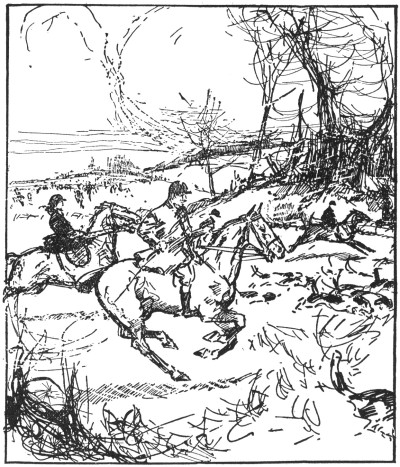 Then down the slope and up the Rood,
Then down the slope and up the Rood,
Went the hunt's gallop.
[Pg 292]
"A dead fox or a broken neck,"
Said Robin Dawe, "Come up, the Dane."
The hunter leant against the rein,
Cocking his ears, he loved to see
The hounds at cry. The hounds and he
The chiefs in all that feast of pace.
The speck in front began to race.
The fox heard hounds get on to his line,
And again the terror went down his spine,
Again the back of his neck felt cold,
From the sense of the hound's teeth taking hold.
But his legs were rested, his heart was good,
He had breath to gallop to Mourne End Wood,
It was four miles more, but an earth at end,
So he put on pace down the Rood Hill Bend.
[Pg 293]
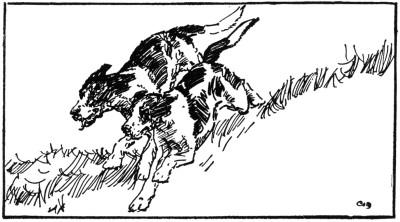
Down the great grass slope which the oak trees dot
With a swerve to the right from the keeper's cot,
Over High Clench brook in its channel deep,
To the grass beyond, where he ran to sheep.
The sheep formed line like a troop of horse,
They swerved, as he passed, to front his course
From behind, as he ran, a cry arose,
"See the sheep, there. Watch them. There he goes."
[Pg 294]
He ran the sheep that their smell might check
The hounds from his scent and save his neck,
But in two fields more he was made aware
That the hounds still ran; Tom had viewed him there.
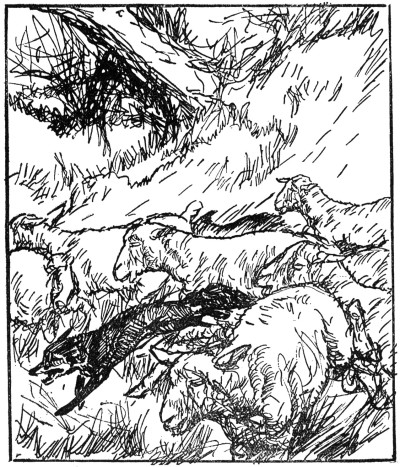 He ran the sheep that their smell might check
He ran the sheep that their smell might check
The hounds from his scent and save his neck.
Tom had held them on through the taint of sheep,
They had kept his line, as they meant to keep,
They were running hard with a burning scent,
And Robin could see which way he went.
The pace that he went brought strain to breath,
He knew as he ran that the grass was death.
He ran the slope towards Morton Tew
That the heave of the hill might stop the view,
Then he doubled down to the Blood Brook red,
And swerved upstream in the brook's deep bed.
[Pg 296]
He splashed the shallows, he swam the deeps,
He crept by banks as a moorhen creeps,
He heard the hounds shoot over his line,
And go on, on, on towards Cheddesdon Zine.
In the minute's peace he could slacken speed,
The ease from the strain was sweet indeed.
Cool to the pads the water flowed,
He reached the bridge on the Cheddesdon road.
As he came to light from the culvert dim,
Two boys on the bridge looked down on him;
They were young Bill Ripple and Harry Meun,
"Look, there be squirrel, a-swimmin', see 'un."
"Noa, ben't a squirrel, be fox, be fox.
Now, Hal, get pebble, we'll give en socks."
[Pg 297]
"Get pebble, Billy, dub un a plaster;
There's for thy belly, I'll learn ee, master."
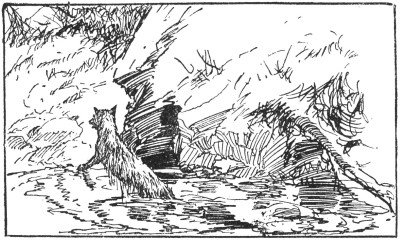
The stones splashed spray in the fox's eyes,
He raced from brook in a burst of shies,
He ran for the reeds in the withy car,
Where the dead flags shake and the wild-duck are.
[Pg 298]
He pushed through the reeds which cracked at his passing,
To the High Clench Water, a grey pool glassing,
He heard Bill Ripple in Cheddesdon road
Shout, "This way, huntsman, it's here he goed."
[Pg 299]
THE LIFTING HORN
[Pg 301]
The Leu Leu Leu went the soft horn's laughter,
The hounds (they had checked) came romping after,
The clop of the hooves on the road was plain,
Then the crackle of reeds, then cries again.
A whimpering first, then Robin's cheer,
Then the Ai Ai Ai; they were all too near;
His swerve had brought but a minute's rest,
Now he ran again, and he ran his best.
With a crackle of dead dry stalks of reed
The hounds came romping at topmost speed,
The redcoats ducked as the great hooves skittered
The Blood Brook's shallows to sheets that glittered;
[Pg 302]
With a cracking whip and a "Hoik, Hoik, Hoik,
Forrard," Tom galloped. Bob shouted "Yoick."
Like a running fire the dead reeds crackled
The hounds' heads lifted, their necks were hackled.
Tom cried to Bob as they thundered through,
"He is running short, we shall kill at Tew."
Bob cried to Tom as they rode in team,
"I was sure, that time, that he turned up-stream.
As the hounds went over the brook in stride,
I saw old Daffodil fling to side,
So I guessed at once, when they checked beyond."
The ducks flew up from the Morton Pond.
The fox looked up at their tailing strings,
He wished (perhaps) that a fox had wings.
Wings with his friends in a great V straining
The autumn sky when the moon is gaining;
[Pg 304]
For better the grey sky's solitude,
Than to be two miles from the Mourne End Wood
With the hounds behind, clean-trained to run,
And your strength half spent and your breath half done.
Better the reeds and the sky and water
Than that hopeless pad from a certain slaughter.
At the Morton Pond the fields began,
Long Tew's green meadows; he ran; he ran.
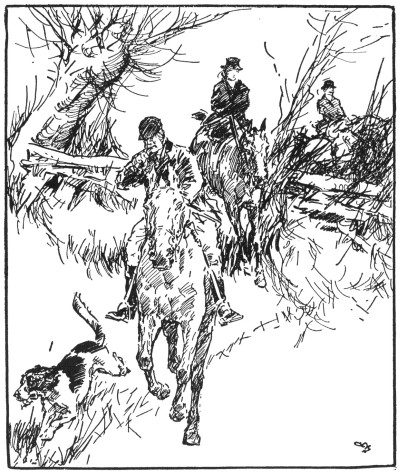 With a cracking whip and a "Hoik, Hoik, Hoik,
With a cracking whip and a "Hoik, Hoik, Hoik,
Forrard," Tom galloped. Bob shouted "Yoick."
First the six green fields that make a mile,
With the lip-full Clench at the side the while,
With the rooks above, slow-circling, shewing
The world of men where a fox was going;
The fields all empty, dead grass, bare hedges,
[Pg 305]
And the brook's bright gleam in the dark of sedges.
To all things else he was dumb and blind,
He ran, with the hounds a field behind.
[Pg 307]
MOURNE END WOOD
[Pg 309]
At the sixth green field came the long slow climb,
To the Mourne End Wood as old as time
Yew woods dark, where they cut for bows,
Oak woods green with the mistletoes,
Dark woods evil, but burrowed deep
With a brock's earth strong, where a fox might sleep.
He saw his point on the heaving hill,
He had failing flesh and a reeling will,
He felt the heave of the hill grow stiff,
He saw black woods, which would shelter—
If—
Nothing else, but the steepening slope,
And a black line nodding, a line of hope,
The line of the yews on the long slope's brow,
[Pg 310]
A mile, three-quarters, a half-mile now.
A quarter-mile, but the hounds had viewed,
They yelled to have him this side the wood;
Robin capped them, Tom Dansey steered them
With a "Yooi, Yooi, Yooi," Bill Ridden cheered them.
Then up went hackles as Shatterer led,
"Mob him," cried Ridden, "the wood's ahead.
Turn him, damn it; Yooi, beauties, beat him.
O God, let them get him; let them eat him.
O God," said Ridden, "I'll eat him stewed,
If you'll let us get him this side the wood."
But the pace, uphill, made a horse like stone,
The pack went wild up the hill alone.
Three hundred yards, and the worst was past,
[Pg 311]
The slope was gentler and shorter-grassed,
The fox saw the bulk of the woods grow tall
On the brae ahead like a barrier-wall.
He saw the skeleton trees show sky,
And the yew trees darken to see him die,
And the line of the woods go reeling black,
There was hope in the woods, and behind, the pack.
Two hundred yards, and the trees grew taller,
Blacker, blinder, as hope grew smaller
Cry seemed nearer, the teeth seemed gripping
Pulling him back, his pads seemed slipping.
He was all one ache, one gasp, one thirsting,
Heart on his chest-bones, beating, bursting,
The hounds were gaining like spotted pards
[Pg 312]
And the wood-hedge still was a hundred yards.
The wood-hedge black was a two year, quick
Cut-and-laid that had sprouted thick
Thorns all over, and strongly plied,
With a clean red ditch on the take-off side.
He saw it now as a redness, topped
With a wattle of thorn-work spiky cropped,
Spiky to leap on, stiff to force,
No safe jump for a failing horse,
But beyond it, darkness of yews together,
Dark green plumes over soft brown feather,
Darkness of woods where scents were blowing
Strange scents, hot scents, of wild things going,
Scents that might draw these hounds away.
So he ran, ran, ran to that clean red clay.
[Pg 313]
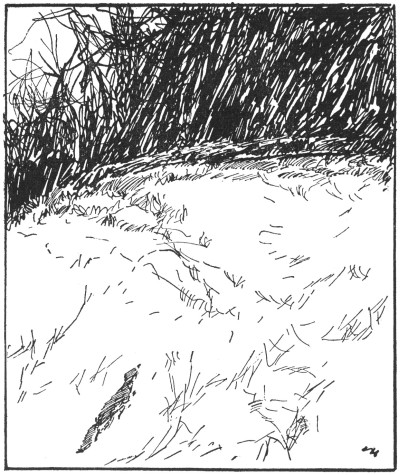 He saw it now as a redness, topped
He saw it now as a redness, topped
With a wattle of thorn-work spiky cropped.
[Pg 314]
Still, as he ran, his pads slipped back,
All his strength seemed to draw the pack,
The trees drew over him dark like Norns,
He was over the ditch and at the thorns.
He thrust at the thorns, which would not yield,
He leaped, but fell, in sight of the field,
The hounds went wild as they saw him fall,
The fence stood stiff like a Bucks flint wall.
He gathered himself for a new attempt,
His life before was an old dream dreamt,
All that he was was a blown fox quaking,
Jumping at thorns too stiff for breaking,
While over the grass in crowd, in cry,
Came the grip teeth grinning to make him die,
[Pg 315]
The eyes intense, dull, smouldering red,
The fell like a ruff round each keen head,
The pace like fire, and scarlet men
Galloping, yelling, "Yooi, eat him, then."
He gathered himself, he leaped, he reached
The top of the hedge like a fish-boat beached,
He steadied a second and then leaped down
To the dark of the wood where bright things drown.
He swerved, sharp right, under young green firs.
Robin called on the Dane with spurs,
He cried "Come, Dansey: if God's not good,
We shall change our fox in this Mourne End wood."
Tom cried back as he charged like spate,
"Mine can't jump that, I must ride to gate."
Robin answered, "I'm going at him.
[Pg 316]
I'll kill that fox, if he kills me, drat him.
We'll kill in covert. Gerr on, now, Dane."
He gripped him tight and he made it plain,
He slowed him down till he almost stood
While his hounds went crash into Mourne End Wood.
Like a dainty dancer with footing nice,
The Dane turned side for a leap in twice.
He cleared the ditch to the red clay bank,
He rose at the fence as his quarters sank,
He barged the fence as the bank gave way
And down he came in a fall of clay.
Robin jumped off him and gasped for breath;
He said, "That's lost him, as sure as death.
[Pg 317]
They've over-run him. Come up, the Dane,
But I'll kill him yet, if we ride to Spain."
He scrambled up to his horse's back,
He thrust through cover, he called his pack,
He cheered them on till they made it good,
Where the fox had swerved inside the wood.
The fox knew well, as he ran the dark,
That the headlong hounds were past their mark.
They had missed his swerve and had overrun.
But their devilish play was not yet done.
[Pg 319]
"DONE"
[Pg 321]
For a minute he ran and heard no sound,
Then a whimper came from a questing hound,
Then a "This way, beauties," and then "Leu Leu,"
The floating laugh of the horn that blew.
Then the cry again and the crash and rattle
Of the shrubs burst back as they ran to battle.
Till the wood behind seemed risen from root,
Crying and crashing to give pursuit,
Till the trees seemed hounds and the air seemed cry,
And the earth so far that he needs but die,
Die where he reeled in the woodland dim
With a hound's white grips in the spine of him;
For one more burst he could spurt, and then
Wait for the teeth, and the wrench, and men.
[Pg 322]
He made his spurt for the Mourne End rocks,
The air blew rank with the taint of fox;
The yews gave way to a greener space
Of great stones strewn in a grassy place.
And there was his earth at the great grey shoulder,
Sunk in the ground, of a granite boulder
A dry deep burrow with rocky roof,
Proof against crowbars, terrier-proof,
Life to the dying, rest for bones.
The earth was stopped; it was filled with stones.
Then, for a moment, his courage failed,
His eyes looked up as his body quailed,
Then the coming of death, which all things dread,
Made him run for the wood ahead.
[Pg 323]
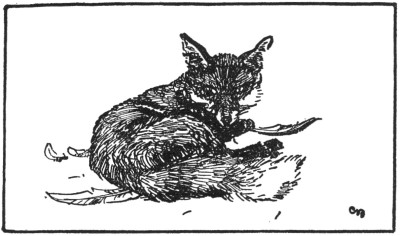
The taint of fox was rank on the air,
He knew, as he ran, there were foxes there.
His strength was broken, his heart was bursting,
His bones were rotten, his throat was thirsting,
His feet were reeling, his brush was thick
From dragging the mud, and his brain was sick.
He thought as he ran of his old delight
[Pg 324]
In the wood in the moon in an April night,
His happy hunting, his winter loving,
The smells of things in the midnight roving;
The look of his dainty-nosing, red
Clean-felled dam with her footpad's tread,
Of his sire, so swift, so game, so cunning
With craft in his brain and power of running,
Their fights of old when his teeth drew blood.
Now he was sick, with his coat all mud.
He crossed the covert, he crawled the bank,
To a meuse in the thorns and there he sank,
With his ears flexed back and his teeth shown white,
In a rat's resolve for a dying bite.
[Pg 325]
PRIZE
[Pg 327]
And there, as he lay, he saw the vale,
That a struggling sunlight silvered pale,
The Deerlip Brook like a strip of steel,
The Nun's Wood Yews where the rabbits squeal,
The great grass square of the Roman Fort,
And the smoke in the elms at Crendon Court.
And above the smoke in the elm-tree tops,
Was the beech-clump's blue, Blown Hilcote Copse,
Where he and his mates had long made merry
In the bloody joys of the rabbit-herry.
And there as he lay and looked, the cry
Of the hounds at head came rousing by;
He bent his bones in the blackthorn dim.
[Pg 328]
But the cry of the hounds was not for him,
Over the fence with a crash they went,
Belly to grass, with a burning scent,
Then came Dansey, yelling to Bob,
"They've changed, O damn it, now here's a job."
And Bob yelled back, "Well, we cannot turn 'em,
It's Jumper and Antic, Tom; we'll learn 'em.
We must just go on, and I hope we kill."
They followed hounds down the Mourne End Hill.
The fox lay still in the rabbit-meuse,
On the dry brown dust of the plumes of yews.
In the bottom below a brook went by,
Blue, in a patch, like a streak of sky.
There, one by one, with a clink of stone,
Came a red or dark coat on a horse half blown.
[Pg 329]
And man to man with a gasp for breath
Said, "Lord, what a run. I'm fagged to death."
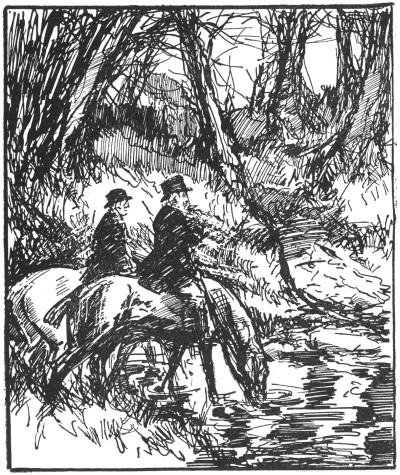 And man to man with a gasp for breath
And man to man with a gasp for breath
Said, "Lord, what a run. I'm fagged to death."
After an hour, no riders came,
The day drew by like an ending game;
A robin sang from a pufft red breast,
The fox lay quiet and took his rest.
A wren on a tree-stump carolled clear,
Then the starlings wheeled in a sudden sheer,
The rooks came home to the twiggy hive
In the elm-tree tops which the winds do drive.
Then the noise of the rooks fell slowly still,
And the lights came out in the Clench Brook Mill
Then a pheasant cocked, then an owl began
With the cry that curdles the blood of man.
[Pg 331]
The stars grew bright as the yews grew black,
The fox rose stiffly and stretched his back.
He flaired the air, then he padded out
To the valley below him dark as doubt,
Winter-thin with the young green crops,
For Old Cold Crendon and Hilcote Copse.
[Pg 333]
HOME
[Pg 335]
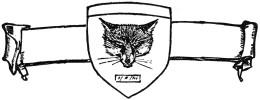
As he crossed the meadows at Naunton Larking,
The dogs in the town all started barking,
For with feet all bloody and flanks all foam,
The hounds and the hunt were limping home:
Limping home in the dark, dead-beaten,
The hounds all rank from a fox they'd eaten,
Dansey saying to Robin Dawe,
"The fastest and longest I ever saw."
And Robin answered, "O Tom, 'twas good,
[Pg 337]
I thought they'd changed in the Mourne End Wood,
But now I feel that they did not change.
We've had a run that was great and strange;
And to kill in the end, at dusk, on grass.
We'll turn to the Cock and take a glass,
For the hounds, poor souls, are past their forces.
And a gallon of ale for our poor horses,
And some bits of bread for the hounds, poor things,
After all they've done (for they've done like kings),
Would keep them going till we get in.
We had it alone from Nun's Wood Whin."
Then Tom replied, "If they changed or not,
There've been few runs longer and none more hot,
We shall talk of to-day until we die."
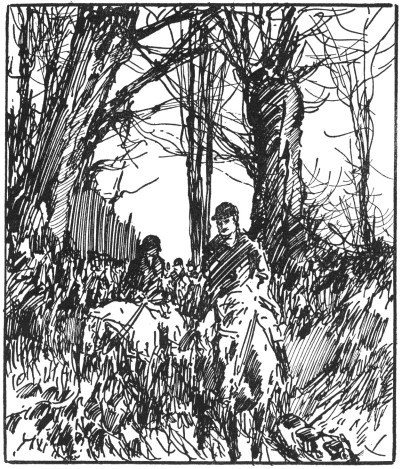 For with feet all bloody and flanks all foam,
For with feet all bloody and flanks all foam,
The hounds and the hunt were limping home.
[Pg 338]
The stars grew bright in the winter sky,
The wind came keen with a tang of frost,
The brook was troubled for new things lost,
The copse was happy for old things found,
The fox came home and he went to ground.
And the hunt came home and the hounds were fed,
They climbed to their bench and went to bed,
The horses in stable loved their straw.
"Good-night, my beauties," said Robin Dawe.
Then the moon came quiet and flooded full
Light and beauty on clouds like wool,
On a feasted fox at rest from hunting,
In the beech wood grey where the brocks were grunting.
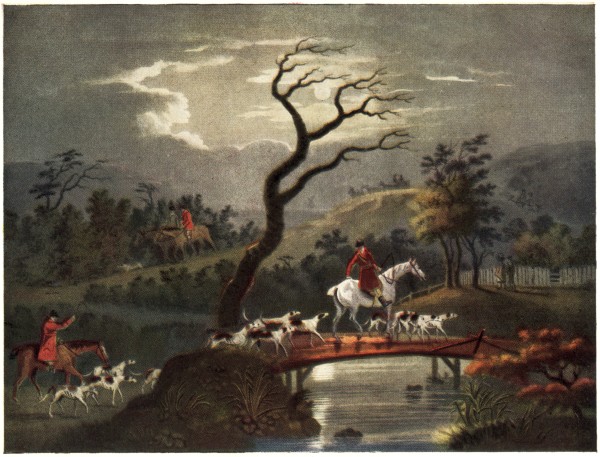 Courtesy Arthur Ackermann and Son, New York
Courtesy Arthur Ackermann and Son, New York
[Pg 339]
The beech wood grey rose dim in the night
With moonlight fallen in pools of light,
The long dead leaves on the ground were rimed.
A clock struck twelve and the church-bells chimed.
Printed in the United States of America.
Transcriber's Notes:
All author's punctuations retained.
All apparent printer's errors and variable spellings retained, including
variable usage of hyphen (e.g. "goodwill" and "good-will") and any other
variable spellings.



